












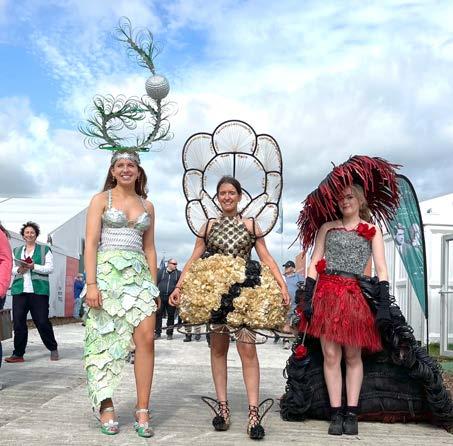

The most glamorous people at the Ploughing were, without question, Mary, Laura and Sarah from the Ursuline Secondary School in Thurles, Co. Tipperary. They made an impression everywhere they went.
The Transition Year students wore outfits made from material that was going to be discarded, dumped, deemed useless. They recycled it with style.
They are among thousands of students nationwide who in recent years have entered the annual Junk Kouture competition. While they didn’t win one of the eight coveted seats to this year's world final in Abu Dhabi, they were happy to attend the Ploughing in Ratheniska. From morning to evening, they engaged in conversations about recycling, care for the environment and design.
Pointing to various parts of her outfit and those worn by her classmates, Sarah Grace Ginnty said:
“This is made from auto carwash material and windscreen glass. This is made from the plastic twine for wrapping peat briquettes.”
Shoelaces and material from leather couches were also used and Minister Catherine Martin was among the interested onlookers.
“We made it all ourselves,” said Sarah Grace proudly.
Junk Kouture is a year-round programme for secondary schools that challenges students aged 13-18 to create couture fashion from 100% recycled materials.
Find out more here: https://www.instagram.com/junkkouture/
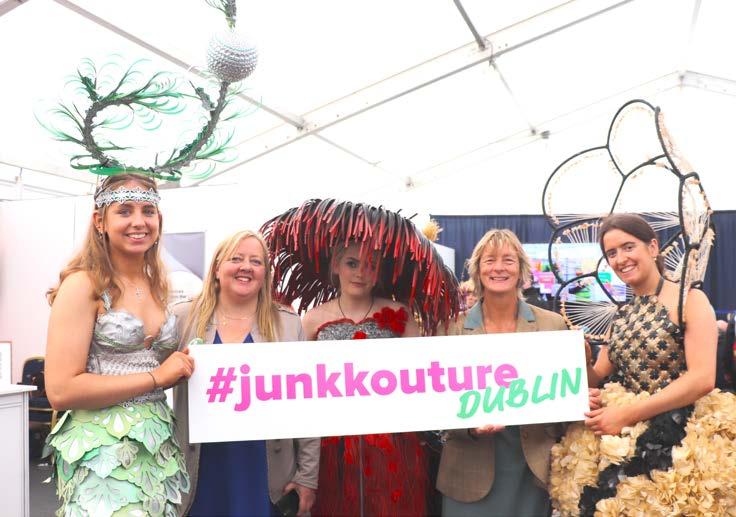 • ABOVE (and RIGHT): TY students from Thurles, Co. Tipperary - Mary Ryan, Sarah Grace Ginty and Laura Hally – wearing junk couture outfits to showcase design and recycling at the Ploughing.
• ABOVE (and RIGHT): TY students from Thurles, Co. Tipperary - Mary Ryan, Sarah Grace Ginty and Laura Hally – wearing junk couture outfits to showcase design and recycling at the Ploughing.

‘Changing Ireland’ is an independent, communitybased, not-for-profit publication.
‘Changing Ireland’ engages in original journalism to highlight the impact of local and community development and social inclusion work in Ireland. We report on action on the ground and provide a space for reflection on what serves people and communities best.
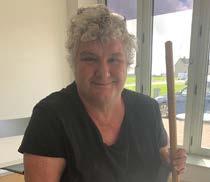
The magazine was established in 2001 and is based in Moyross, Limerick. We value social justice, equality and fair play and to aim to give people who are rarely heard a voice.
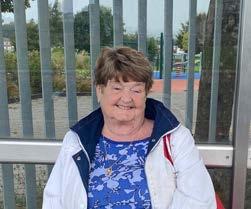
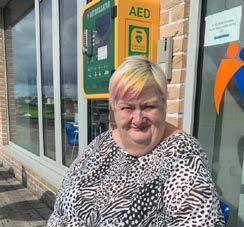
We produce journalism to highlight valuable work funded or supported by Government departments and agencies. We provide a platform for those on the ground in communities.
Our readers include workers, activists and volunteers nationwide, civil and public servants and many more involved in social inclusion and community development.
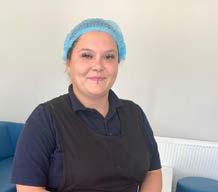
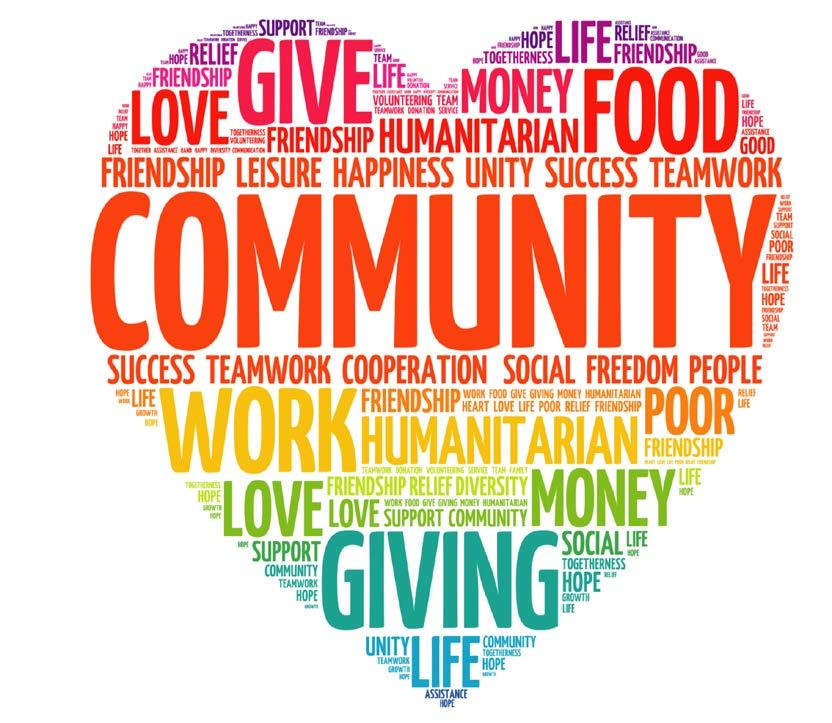
‘Changing Ireland’ is core-funded by the Department of Rural and Community Development.
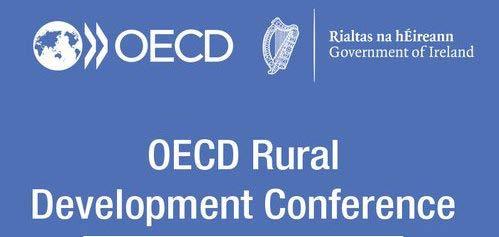
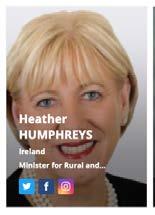
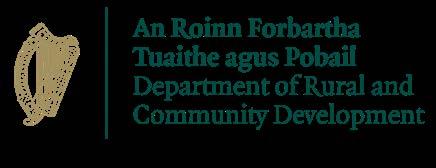
See page 4 for information about the team behind ‘Changing Ireland’.
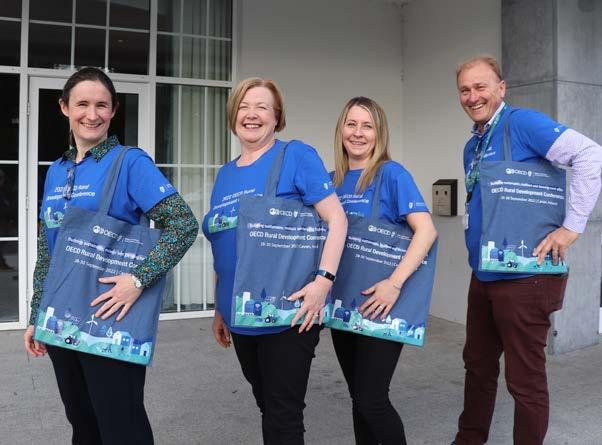

‘Changing Ireland’ generates a small amount of social enterprise revenue. It is core-funded by Government since 2001, receiving support from the:

Sharon, Nicole, Marie,
SICAP
in Cavan - 11-13 -

Columbia, Czech Rep., USA, Sweden, Finland and the Kingdom of Kerry
Taoiseach
transition
& a
about Gov's

O'Brien
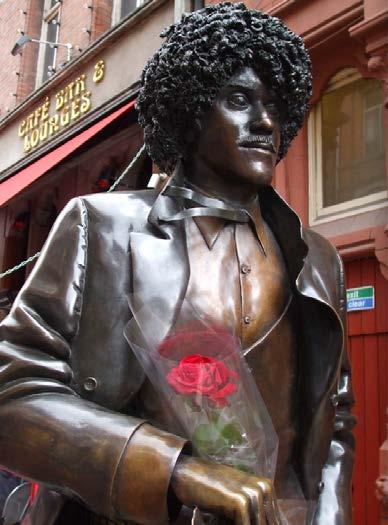
- 34-35 - The
in
It was marvellous to be back at the Ploughing Championships and to meet people face-to-face. The most impressive of the many I met in Ratheniska were three Transition Year students from Thurles, Co. Tipperary, who walked around for the day dressed from head to toe in recycled material. I'd heard about Junk Kouture, but seeing is believing.
They deserve the front cover. We really must rethink waste and recycling. If I had my way, I'd start by not targetting the consumer as the priority, but the marketeers. We don't need a quarter of the packaging our meat, vegetables and other food comes in.
Speaking to MEP Grace O'Sullivan (you really can bump into anyone at the Ploughing) I raised my point about packaging and she happily reported that the EU is working on that matter right now. Hope so. Can they speed it up?
* * * *
Ireland’s international profile got a strong push during the OECD Rural Development Conference held in Cavan recently.
The attendance of 400 overseas delegates from 38 countries, including ministers, European Commission officials and the Deputy Director of the OECD. Representing Ireland were An Taoiseach, Micheál Martin, Agriculture Minister Charlie McConalogue, European Commissioner Máiréad McGuinness, our OECD embassador and reps from Bord Bia, the IDA and Fáilte Ireland.
Above all, the conference afforded an opportunity to showcase rural and community policy and Ministers Heather Humphreys and Joe O’Brien and senior management from the Department of Rural and Community Development led and facilitated discussions in these areas. Minister O’Brien told delegates that, whatever challenges communities face, they must be “at the heart of the process to design solutions”.
I was pleased to hear one of the most senior people present call for us to rethink development and to seriously look at embracing zero growth.
The Taoiseach spoke of inclusion, optimism and a just transition. He also emphasised Ireland's stance in relation to Russia's war on Ukraine and our commitment to supporting
Ukrainian refugees.
* * * * *On that note, we'd like to hear from you if a group you're part of, or support, is making life easier for refugees and asylum-seekers.
We want to hear positive stories of support at local level.

That isn't for a minute to ignore the fact that the Government hasn't and can't build enough houses for all fast enough. Or that some Irish people, rightly or wrongly, feel bypassed.
While we won't ignore those factors, feeding on positivity during a crisis, never mind multiple crises, is essential.
* * * * *This brings me to the tragedy in Creeslough. The community responded with bravery, strength and dignity amidst the greatest hurt. Our sympathies and solidarity to all the bereaved and injured, to all in Donegal and its diaspora.
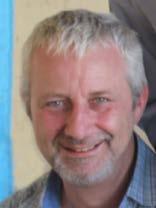
If you believe in Community Development and enjoy writing, why not file a report for us about your community project and what makes it unique. 300-400 words is plenty (and a photo if possible). Certain criteria apply. Your first point of contact should be the editor.
Established in 2001, ‘Changing Ireland’ is a national magazine

on community development and social inclusion. It
managed and published by Changing Ireland Community Media CLG., through funding from the Department of Rural & Community Development.
Editor: 061-326057.
‘Changing Ireland’, Moyross Community Hub, Moyross, Limerick, V94 V0NP.
Production: Editor: Allen Meagher. Journalist: Kathy Masterson. Students on placement: Caoimhe Lalor and Ella Jones-Bourke. Editorial Team: Joe Saunders, Robert Carey, Viv Sadd, Paul Geraghty/Bernie Reape/Padraic Sweeney and Allen Meagher. Packing and Distribution: Speedpak, Dublin, an awardwinning social enterprise. Printed by: Davis Printers, Limerick. Voluntary Board of Directors: Shane O’Sullivan (chair), George Clancy (vice), Andrew O’Byrne, Cathy Jones and Seamus McGiff (sec).
Thanks To . . .‘Changing Ireland’ thanks everyone involved in the production of Issue 78.
Front Cover: MAIN PICTURE: TY students from Ursuline Secondary School in Thurles, Co. Tipperary - Mary Ryan, Laura Hally and Sarah Grace Ginty – wearing junk couture outfits to showcase design and recycling at the Ploughing. Below Left: Hanna Buhaiova in Co. Kerry. Below Right: Tom Douglas's big pear tree in Killarney Men's Shed.
The views expressed in this magazine are those of the author concerned. They do not, by any means, necessarily reflect the views of the editor, the editorial team, the voluntary management board of Changing Ireland Community Media CLG, or its core-funder the Department of Rural & Community Development.
The newest member of the Changing Ireland team, Kathy hails from Dublin but has been living in Co Clare for more than a decade. She has worked in regional newspapers in Limerick, Wexford, Kildare and Dublin; her work has also featured in several national newspapers and magazines. She is most proud of the fact that she has travelled to all 32 counties of Ireland, and once drove a Formula 3 racing car around Mondello.
Drug and gang-related crime is having a severe impact on Inchicore and recently included an afternoon shooting at a block of flats housing one of the country's most resilient community projects.
Co-ordinator Rita Fagan of St Michael’s Estate Family Resource Centre has shared her project's regular newsletter that highlights all they do to nurture peace, safety and empowerment. She also appealed for solidarity with the community in Inchicore and for more support.
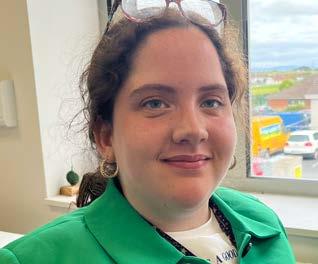
The community has experienced violence in recent times and the project offices came under fire in the midst one recent incident.
The project receives funding and support through the Social Inclusion and Community Activation Programme, Tusla, Dublin City Council, the Community Foundation of Ireland, and Dublin South City Partnership, among others.
In St. Michael's latest newsletter, Ms. Fagan writes:

"Dear Deputies, Counsellors, Officials, Friends and Supporters of the Family Resource Centre
St Michael’s Estate Community Development Project,
"There has been a lot of talk and response to the crisis relating to anti-social behaviour and its consequences in Cherry Orchard. However, running parallel to this, anti-social behaviour has embedded itself in many hotspots throughout
Dublin.
"We have witnessed really awful, chronic, anti-social behaviour here in the small communities of Inchicore as a result of drugs and gang culture; an attempted shooting into the block in Tyrone Place where we are located at 16:00 in the afternoon, followed by a siege of this block also and an innocent victim chased from the canal and cornered in Thornton Heights and set on fire," she wrote.
She rightly encourages all to read the newsletter to see what staff and volunteers in St Michael’s Family Resource Centre Community Development Project are doing "to reclaim the community and lift the people’s spirits".
If you want to know why community development - often invisible - is so important, visit St. Michael's, or read their newsletter which is full of activities undertaken in a beleaguered yet proud community.
To subscribe to the newsletter, or to contact St. Michael's, and/or to express solidarity, email: rita.fagan@frcsme.ie
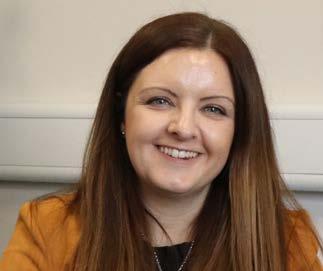
Minister for Rural and Community Development, Heather Humphreys, has appealed for co-operation with the first ever survey of social enterprises in the Republic of Ireland.
“My Department is devising a new social enterprise policy and we need your help," she said in a video appeal. "We want to get a better picture of the number of social enterprises in Ireland, where you operate, how many staff you employ and the services you supply."
"The project is being led by a consortium including Amárach Research, Social Enterprise Republic of Ireland (SERI) and Irish Local Development Network (ILDN) who will be contacting you shortly," she added.

The ILDN said:
“All Social Enterprises are kindly requested to fill it out so that Government can make policy
and allot the relevant resources to a sector that is doing so much for society, the economy, and the environment.”
Lorraine Corcoran, SERI director, said, “This is a key project, not only for the much needed data that will be produced, but it is also an opportunity for the Social Enterprise sector to come together, collaborate and gather evidence.”
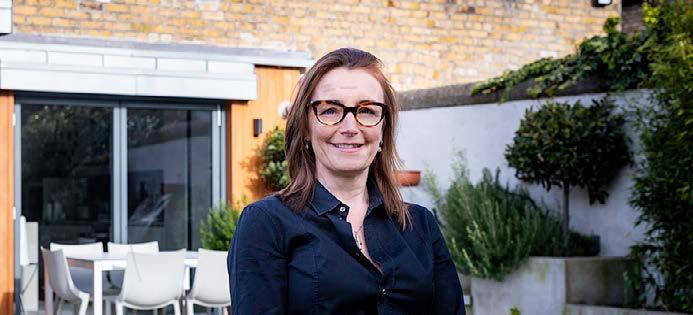
The survey, which began in September, is designed to take at most 20 minutes.
Surveying will be completed by the end of the year and the results published on www.gov.ie
For more information, email: project.team@sedatacollection.ie
Or better still, start the survey right now - here: https://panel. amarachsurveys.ie/S2/s
• Damien Quinn always wanted to work in community development. And now he does, but it was a long journey, with many unnecessary barriers.
• He says there has to be a cut off point for people who have served time, himself included.
• He has strong backing for a project he began in UCC - Spéire Nua, which has answers for exprisoners trying to reintegrate into society.
BYGuess the first thing I wanted to ask when Galway Rural Development CEO, Steve Dolan, suggested - out of the blue - that I interview a community worker called Damien Quinn who had spent three years in prison was. I wanted to ask: "What was he in prison for?"
Throughout the interview, I wondered, but held back because I felt it wasn't fair to ask.
The 'Connacht Tribune' out that week told a wide audience what Damien did time for. I've read it since. An interview he conducted with 'The Two Norries' covered his past. I've listened carefully. It's an utterly absorbing hour-long podcast that 10,000 people have watched on Youtube.
But for our interview, I knew his wish in meeting me was to get across to readers that the past shouldn't matter if people are striving to make a new start. He had set up a new project to help ex-prisoners move on
with their lives. It was not easy when he came out. Whenever he went for a job, he was always asked first: What did you do?
Despite being a model prisoner and availing of all the education he could while behind bars, he was denied an opportunity (house / job / etc) for so long that he relapsed into drugs and fled the country, wandering the streets of England, Germany and France (two weeks homeless on the continent while on drugs were "horrific", he said).
He dearly wished to work in community - and while it was a long road, he now wants others to get a fresh start and not hit the walls he did.
"I hate to think other people going to come up against the barriers I did."
Damien began our interview by talking about his project, Spéire Nua.
“It started as a college project (in UCC) when I was doing a masters in social enterprise and co-operatives,” said Damien, explaining how it
evolved:
“I went to a UCC open day and heard about a former student of the Centre for Co-operative Studies –Siobhán Cafferty - who wrote a paper about integrating violent ex-offenders into the workforce. It was called ‘New Way Forward’.
"I said to myself, ‘I need to speak to her and tell her what I’ve been experiencing here in the west.’
“So, I signed up for the course and my dissertation led to 'Spéire Nua'. My paper was called ‘Life After Prison for Reformed IndividualsBarriers and Opportunities’ – and I’ve experienced many barriers due to my offending behaviour when I was looking for opportunities.
“Dr Carol Power and Dr Bridget Carroll supervised my dissertation and it was completely alien to them, but they were brilliant - and Noreen Byrne. I heard about yourselves through Noreen and I’ve been reading and following ye ever since.”
While at UCC, Damien’s research brought him in contact with many in the prison sector.
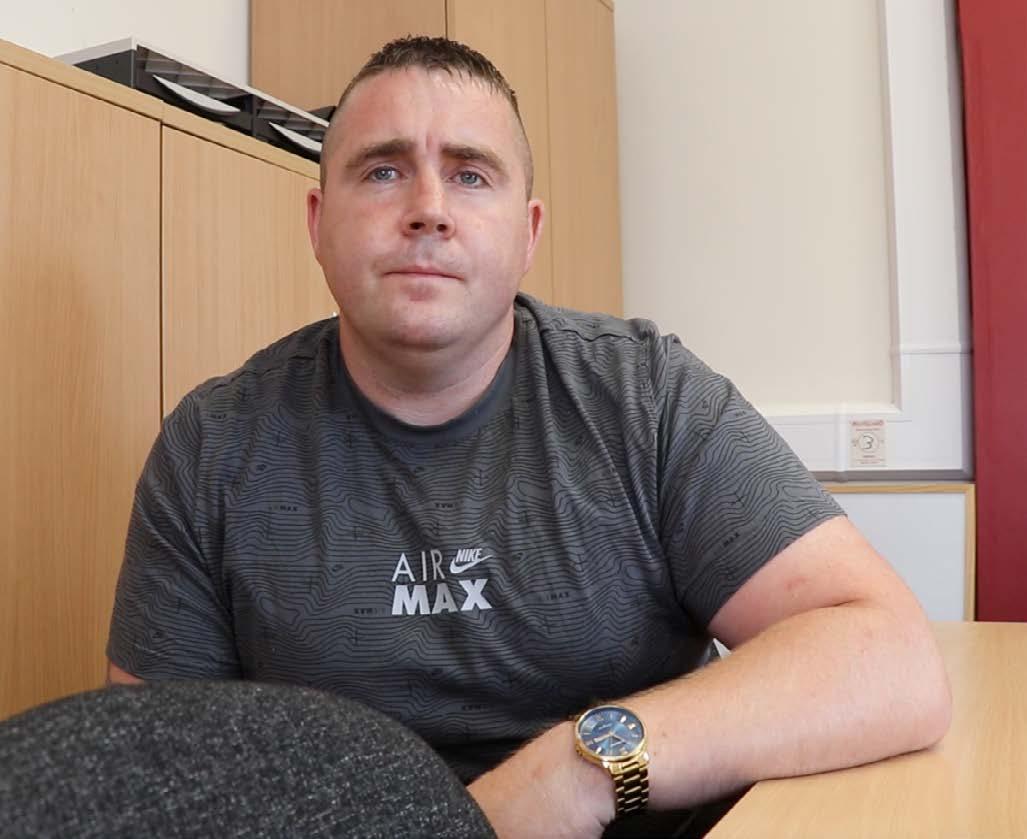
“All of them could see the merit in what I was saying,” he said.
His research led him to meet and connect with Governor Eddie Mullins, the Probation Service, the Irish Association for Social Inclusion Opportunities (IASIO), and The Pathways Centre in Dublin city centre. Pathways is an outreach educational service run by the City of Dublin Education and Training Board (CDETB) for former prisoners, their families and the wider community.
While some dissertations – most –gather dust, Damien’s project, based as it was on personal experience on the inside of the Irish prison system, attracted interest.
“When I saw Social Entrepreneurs Ireland (SEI) were advertising for their ‘Ideas Academy’ for 2021, I pitched the idea to them. They gave us seed funding to develop a
website and to get the project up and running.”
“And the very same week that the SEI announced the funding, I got the job here with Galway Rural Development (GRD) as the social enterprise regeneration project co-ordinator. That had me organising online training around HR management, procurement, digital marketing and so on across Galway, Mayo and Roscommon. It was a Covid support and has come to an end now.
“It’s a decade since I was in prison. I always wanted to work in community development and now I’m in and I’m busy!"
Halfway through his Covid-related contract, Damien was taken on as GRD's community education and disability officer.
"Now I help people from the ages of 25 and over to get into community education and I’m the disability officer for the entire county.”
Why couldn’t Damien – who excelled in education while in prison – just walk into a job on leaving prison? Therein lies the problem.
“I used my three years [in prison] to the best of my abilities. I said I’d get an education I could use to get started as soon as I was left out.
“The reality was: Going for a house – there was Garda vetting. Volunteering - Garda vetting. Applying for a job - Garda vetting. Education - Garda vetting. Every time.
“I say it all the time – prison was the easy part,” he said.
If life after prison was hard, life before prison was also tough..
He speaks at length about his early years and his family life then and now in the podcast with 'The Two Norries' (really worth watching).
Growing up Irish in England, he was picked on. Then, in his early teens, the family home broke up and he returned to Ireland only to face
reverse-racism for being seen as English in Ireland.
Aged 14, he took drugs for the first time, left school early, andwhile enjoying work - he found it harder and harder to hold down a regular job. He couldn't compete with immigrants with much higher education than he had. He tried returning to education - and was going well - but despite his best efforts, a life tainted by drug-related activities took him on a precarious journey.
“My life before prison was chaos,” he said, “whereas in prison you have a structure, routine, school, work programmes, shelter. You don’t have to worry about bills. You can reflect on and work on yourself. Some people use it that way. I did. Some people don’t obviously," he said.
“It’s when you get out though - that’s the punishment. Barriers pop up every time you try to make
progress. That's counter-productive.”
“A lot of people get out and have nowhere to go,” he said. "They go around in circles, even though they want to progess and make amends."
"Giving back is huge. A lot of people I met in prison wanted to give back. They were planning to rebuild family relationships, give back to the community, make amends, to be somebody. Unfortunately some of them are now dead or back where they started, because they couldn’t get any opportunity - because of who they are, where they’re from and what they did."
He quoted from a study which found that 82% of ex-offenders believe that their past will prevent them from securing opportunities.
“If they already believe that they won’t even try to change,” he said.
'Spéire Nua' is Irish for new horizon, or new beginning. Based in Athenry, Spéire Nua is a volunteer-led project that has developed a process (partly adapted from abroad) that validates a former prisoner's commitment to change.
Although a few ex-prisoners have benefited from Spéire Nua's support, it is early days. Google has lent support and the scheme is currently being piloted in Co. Galway, in partnership with an Athenry-based organisation called Amicitia.
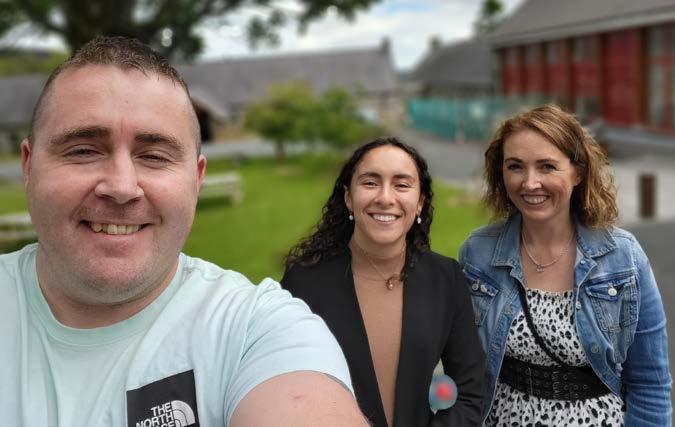
Peer mentoring forms a core part of Spéire Nua's approach.
With a feasibility study underway, Spéire Nua may possibly be ready to go national next year. Ultimately, with the co-operation of business networks and the criminal justice system, it could see former prisoners awarded certificates that demonstrate their commitment to change, thereby opening up opportunities denied to them at present.
His own experience was brutal.
"I’ve had thousands of ‘no's’ based on Garda vetting.
“Employers should think about how having a criminal conviction can impact on the job at hand.
“If I was a sex offender and going driving an ice-cream van – obviously Garda vetting must apply.
“If I was involved in financial crime, obviously Garda vetting should apply if I’m going for a job in a bank.
"It's about getting the balance right. I remember going for a job assembling car parts in a factory at night-time. It was a large factory floor with cameras everywhere and I was very unlikely to come into contact with children or vulnerable adults. That’s what the [vetting] Act is there to protect.
"I passed the aptitude and other tests and then I had to disclose my convictions. I didn’t get the job.
“I’ve seen cleaning jobs look for vetting. Garda vetting applies everywhere.
“Luckily I caught the break to work in community development and I grabbed it with both hands. I’m in a good space now, but it bothers me to think of anyone else with a similar background.”
Damien's Spéire Nua project is attracting support across the criminal justice sectors, not just in the ROI, but in Northern Ireland and in Britain. Damien believes we must take the lead from best practice in
“It’s a decade since I was in prison. I always wanted to work in community development and now I’m in and I’m busy!"
other countries. At present, the model is being trialled in Co. Galway.
“Spéire Nua seeks to recognise someone's steps away from a life of crime.
"It’s a brand new approach to reducing repeat offending. We’ve never had anything like this in the country.
"In America, they have expungements and certificates of rehabilitation.
"Norway has certificates of good conduct and their repeat offending rates are 20 per cent, whereas ours are 50 per cent. Currently, in Ireland, it’s purely negative.
"We want to change that and Spéire Nua has developed an ongoing assessment model that looks to 'validate your commitment to change'.
"We seek an up-to-date balanced view rather than a historic and
purely negative view of the person. Expungment would be the ultimate goal.
“And if we can help the person to fix themselves, it will benefit everyone around them. Everybody wins when someone can turn their life around. I know everyone in my life is a lot happier with me now than when I was doing what I was doing.
“And when you’ve made a decision to change and you’ve done all the right things, you should get credit for it," said Damien.
He is optimistic. "There are a lot of good things happening in the criminal justice sector," said Damien.
As a Kickstart awardee and in partnership with a local group in Athenry, he applied for funding for a feasibility study.
"All going well, we’ll hold an employers’ forum, to get it right from their point of view. We would
also like the benchmarking system developed by the gardaí so they can comfortably sign off on an exprisoner's current behavour."
If this happens and the benchmarking takes off, it would be revolutionary in smashing through barriers that have held back generations of people.
"Crime occurs in the most deprived areas. Unfortunately, it’s normal in a lot of places. It’s deemed necessary. I’m not excusing it, but it’s a way of life in in certain pockets of our community. Not everyone gets going from the same starting point in life," he said.
Should community groups take on more ex-prisoners?
"Absolutely, they should give people a go." He spoke about a few
great business people and employers in Tuam who gave jobs to people after prison. He was hired himself by an auctioneer and later by a distribution company. In the latter job, he was promoted and was able to give work to others needing a break.
Applying to be a volunteer was a worry for Damien. Unnecessarily so.
"The late Tony Lee was vicepresident of community games. I wanted to volunteer and we had a discussion about Garda vetting. He sat back for a second, then he leaned into me and asked ‘What have you done since getting out?’
"No employer asked me that. All they wanted to know was what happened with the crime. I'd tell them and then I never heard from them again."
So, what did he do? Nothing out of the ordinary. He was caught with...
Well, if you're curious to know, google Damien's interview with 'The Two Norries' - it's on Youtube.
• Damien Quinn found it “surreal” to visit prison, not in need of help, but “as someone who helps others instead”. He visited as part of a Common Purpose leadership programme.
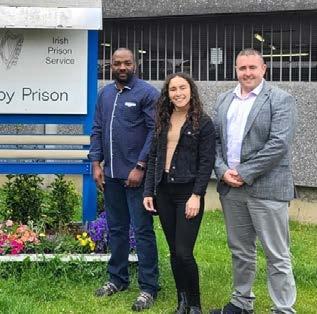
Common Purpose is a Britishfounded not-for-profit organisation that runs leadership development programmes around the world. It has run these programmes since 1989 in 200 cities worldwide.
It works with a wide range of organisations and individuals across the business, public and civil society sectors.
"I’m on one of these emerging leaders programmes with Common Purpose Ireland and we had a fantastic experience recently. We had a day in prison," said Damien.
"We all went into the Dochas prison for women, in the live prison setting.
"There are people on my course from policy and social enterprise backgrounds, people from the Department of Rural and Community Development, people from Rethink Ireland and people from the Glencree Centre for Reconciliation. These people had very limited experience of offending behaviour.
"The whole idea [of the visit] was to suspend your assumptions. What I mean by that is - when you read in the paper about someone that did something wrong you’re thinking ‘scumbags’ or whatever, but when you understand the life they were living and they chaos they came from, all of a sudden your thinking changes.
"That day, I saw the emotion in them (his course colleagues). I could
see empathy, real understanding. It was a beautiful thing to see. It definitely changed the way they think and is an experience that will stay with them for a long time. And with me too."
"Common Purpose is a fantastic programme. I’d highly recommend taking part.
"One of the things they teach is cultural intelligence. It’s the ability to land anywhere in the world and understand the people you’re landed with.
"I was teaching youth work recently and I realised that youngsters today are growing up in a completely different world. It’s culturally different to the world we grew up in.
"It’s important to take the time to understand where other people are coming from, what they’re experiencing and to listen to what they’re saying. Don't formulate an answer in your head. Really
hear what they say. If you do, it's invaluable."

"Common Purpose also cover role clarification.
"For example, I didn’t fully understand who Probation were when I was in prison. I know today they are there to help us. Back then, I thought they were an ear for the guards and I only told them what I thought they wanted to hear, rather than what I needed to say.
"People presume we understand Probation, but how would we know, we’ve never experienced it before. People need to clarify their roles.
"If they took the time to say, 'This is who we are.' 'This is why you’re with us and this is what we’re going to do with you.' And - 'We’re here to help.' If they did that, I guarantee you they’ll have a completely different conversation with the people they're trying to reach."
The Legacy Programme is a global campaign by the Common Purpose* organisation which brings together young people aged 18 to 25 and facilitates them to think 20-30 years ahead and plan their legacy for their city.
Over three days, from October 26 to 28th, one hundred young leaders will meet in locations around Dublin, including Google's building - The Foundry - to address the question “How can we make this a city for all?”
They will explore the future of their city in terms of their human, social and civic impact. Reimagining the community, the workplace and the environment 20 years from now, they will be challenged to come up with solutions rooted in inclusion and purpose.
Legacy Dublin 22 is sponsored by IDA Ireland, the Department of Rural and Community Development (DRCD), Foróige, Google and others.
Speaking before the event, CEO of Common Purpose Ireland, Dara Connolly, said that the demand for effective leadership has never been greater and he predicted:
"The ideas that come from these three days will be incredible, as they have been to date around the world."
He said: “Legacy is a unique initiative for empowering young people to have a voice in their future. It has already run in 15 locations around the world to date including Boston, Chicago, Singapore, London and soon to go live in Bangladesh, India and Germany.
"We are excited to see it taking place in Dublin in 2022, the year of the centenary of the state, a suitable
• What
for others.
statue,
O'Connell St, Dublin.
time to look forward as well as back."
He added: “Common Purpose and its partners will bring a really diverse group together: some in employment, some not; some studying, some volunteering, some new to Ireland.
He said that the key for this programme "is to be as inclusive as possible, allowing the participants to listen and learn from their peers and work on projects together to imagine a city for all".
Common Purpose and DRCD were in discussions to ensure that those attending this year’s event are truly representative of all Dublin communities.
This led to the Department sponsoring up to 20 places for those who participate in activities under the Social Inclusion and Community Activation Programme (SICAP) across the city.
Minister of State for Community Development, Joe O’Brien, welcomed the involvement of those
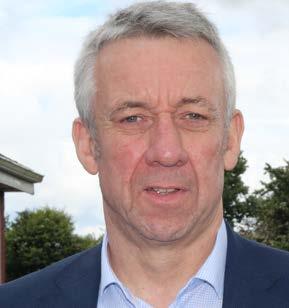
from SICAP initiatives in the Legacy Programme.
He said, “We all need to reimagine our capital city and plan for its sustainable, inclusive future. Such a conversation cannot happen without young people from communities where SICAP plays such a big role.
"I am pleased to support SICAP’s involvement in the Legacy Programme in order to ensure that the voice of all young people is heard and valued," he said.
Local Development Companies across the city are coordinating the participation through SICAP.
Una Lowry is the CEO of Dublin South City Partnership and she says it is vital to provide appropriate supports to the young people:
“The format of such events is often off-putting to those from disadvantaged communities but it is vital that their voice be heard at influential gatherings," she said.
"In our work, we come across so many examples of inspiring leadership and potential within our SICAP groups and so we have come together to give them maximum
• Una Lowry, CEO of Dublin South City Partnership.
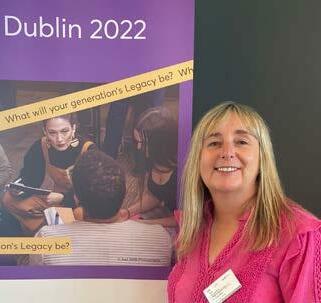
support to participate fully in Dublin’s Legacy Programme this year," she said.
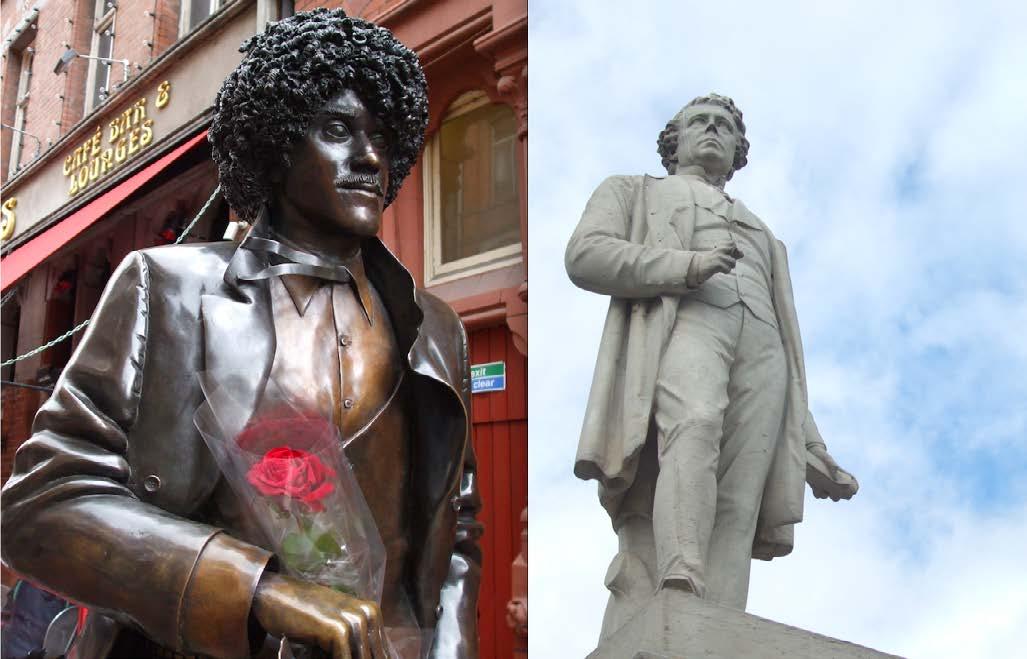
For more, visit the Common Purpose website:
https://commonpurpose.org/ What is Common Purpose?
See page 9.
- In October, youth leaders in Dublin will plan their legacy for the city WHAT WILL YOUR LEGACY BE?
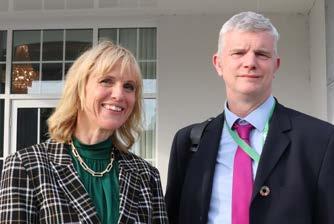
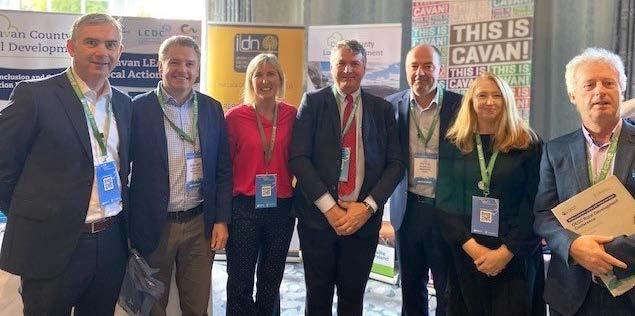
• Speaking in Cavan, Minister O'Brien said, "Ireland has a very strong and complex relationship between the State and the Community and Voluntary Sector. We need to develop it more as it is a key asset in bringing and building more diverse voices into rural policy."
Joe O’Brien, Minister of State for Community Development, spoke at an OECD rural development conference held in Cavan, on September 29th.

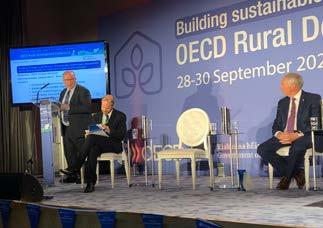
Recent new government initiatives to support rural development in Ireland convinced the OECD (Organisation for Economic Cooperation and Development) to hold its conference here. This provided the Taoiseach (see next page) and Minister O’Brien with a platform to highlight work on social inclusion.
The attendance of 400 delegates from 38 countries included ministers, European Commission officials and the deputy director of the OECD.
The Minister said that whatever challenges communities face, they themselves must be “at the heart of process to design solutions”.
The challenge for policymakers is to ensure their voices are given space so policies are formed from the ground up.
In 2019, the Department partnered with community organisations and co-produced a five-year strategy for ‘Sustainable, Inclusive and Empowered Communities’ which is now being implemented.
“My own Department is leading in ensuring communities are central. We are not alone in this. Leadership is being shown by community organisations across the country,” said the Minister.
In November, the Minister will host the first Civic Forum for formal dialogue between the Community and Voluntary Sector, the State and local government.
He said, “We are committed to actions which bring communities together" and to empowering them.
He spoke of action to develop and test strategies to help engage the most marginalised and nonrepresented communities to get involved in statutory decision making at local level. This currently involves local authorities in Clare, Fingal, Galway and Wicklow working on ways to better engage Travellers and the LGBTQI+ community.
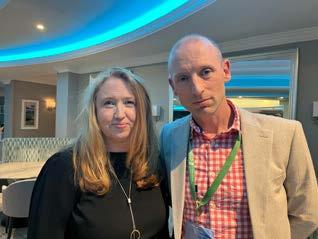
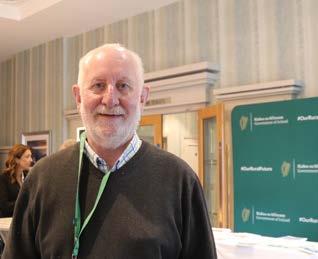
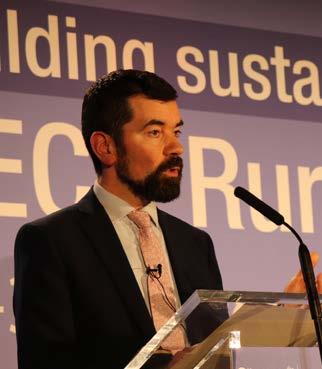
The Minister spoke with pride about the Government’s main social inclusion programme – the Social Inclusion and Community Activation Programme (SICAP). He spoke of its unique contribution during the current Ukraine crisis and also
during the pandemic - work that was recognised with a prestigious UN Public Service award for institutional resilience and innovative responses.
He described SICAP as “essentially 600 community workers working in disadvantaged communities across the country. When it comes to building voices and bringing people to the table, SICAP stands out,” he said.
Earlier this year, the Department launched the Empowering Communities Programme to address deeply-embedded, multigenerational deprivation. It targets area-based deprivation using a community development approach and is supporting initiatives in parts of Dublin, Cork and Limerick as well in Mullingar, Athy, Longford, Ballinasloe, Ballina and Arranmore. The focus is on building capacity and voice.

Established in 2014, Public Participation Networks (PPNs) have undergone a review that has just been published. The review’s key aim was to see how PPNs can be strengthened and better supported. He described them as “another vital way of ensuring diversity of local voices are heard and heeded.”
Ireland’s first National Social Enterprise Strategy was launched in 2019 and, this year, a national survey of social enterprises was conducted. This approach supports communities to implement solutions of their own at local level.
The Minister told how the Department supports social enterprise through its Community Services Programme and provides funding for social enterprise through the local authorities, the Irish Local Development Network and Rethink Ireland.
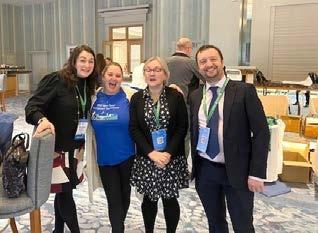
An Taoiseach Micheál Martin has committed his government to protect rural communities during what he termed the "shared, all-encompassing but necessary transition" to come.
The key themes of his address to the 13th OECD Rural Conference, held in Cavan, were inclusion, optimism and a just transition.
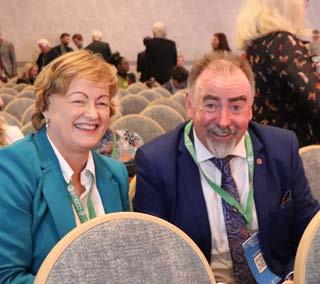
On inclusion, he told delegates that “supporting inclusion in rural areas will be key in the face of these transitions. Inclusive and sustainable economic growth, alongside social cohesion in rural regions, must be a priority.”
He addressed the huge change that has been happening in rural areas and pledged that they will be supported to embrace diversity and equality,
“Ensuring the long-term vitality of our rural places requires us to acknowledge and amplify the voice and contribution of women, youth, older people, ethnic minorities, members of the LGBTI+ community and other groups who call our rural communities home," he said.
He regretted how talk of decline had dominated the agenda on rural areas: “We must move from discussions characterised by sympathy and solidarity to those defined by optimism and opportunity. With the resources and talent available in rural areas, our rural
communities and economies can play a pivotal role in shaping our collective future.”
On climate change, he said, "As we work towards carbon neutrality, it is vital that we ensure that nobody is left behind and that a Just Transition pathway be found - one which delivers alternative job opportunities to those most affected."
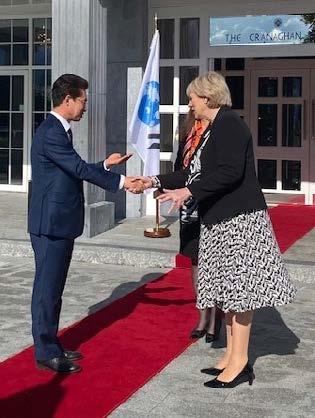
He highlighted an initiative under the national Just Transition Fund (launched in 2020) "which
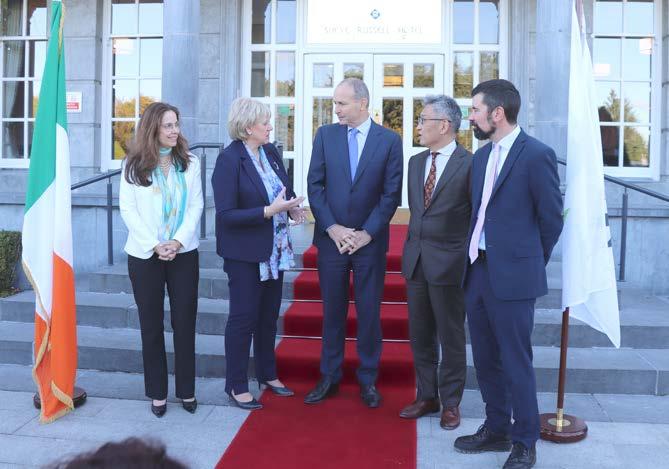
will support Ireland’s Midlands region to address the impact of the transition out of peat for electricity generation."
He said the fund supports "innovative projects and employment" and "will support the Midlands region to address the impact of the transition out of peat for electricity generation."
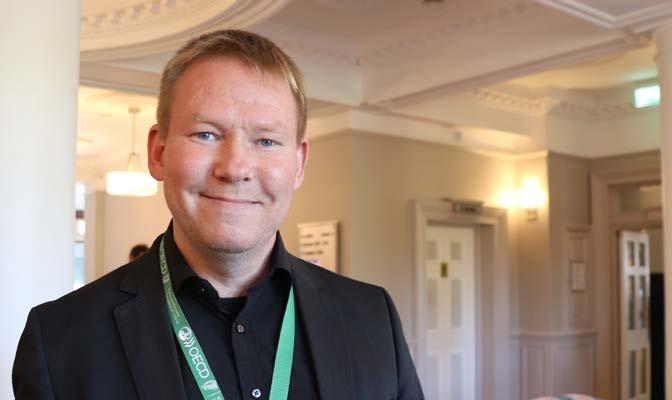
He acknowledged it will be challenging to reach the greenhouse gas emission targets.
In an interesting development which has echoes of New Zealand’s move to measure national well-being beyond GDP, the Taoiseach said that the government was progressing the Programme for Government commitment to develop a wellbeing framework to measure how well we are doing overall including a focus on equality, inclusion and ‘facilitating all our people to live fulfilling and meaningful lives with dignity.’
He said: “Huge crisis waves –

climate change, covid, war - are falling on us. Resilience is needed. We have to change our policy methods. The bottom-up approach is needed more than ever.”

Petri Rinne is a Finnish local action group manager with LEADER and a renowned rural activist.
• Bairbre Nic Aongusa, assistant secretary in the Department of Rural and Community Development pictured in Cavan with Ryan Howard, CEO of South East Cork Area Development.
NEWS / INTERVIEWS / PICS/ VIDEO BY: JOE SAUNDERS & ALLEN MEAGHER
• Korean Minister Dae Chol Kwon is welcomed to Cavan by Minister Heather Humphreys.
Marion Eckardt from Sweden is the president of the European LEADER Association for Rural Development (Elard). She made two points when we spoke to her in Cavan at the OECD rural development conference.

Marion has been to many conferences where “everyone agrees” we need more participatory approaches, more community-led local development.
“But what I don’t see is any action. I see everybody agreeing that it’s important, but I don’t see any raised funding. We need funding to
make (it happen).”
Secondly, she said, “Now is the time to think about what comes beyond unlimited growth. We have had the development paradigm for such a long time. We need to go in another direction now. Civil society is ready to work on that. We cannot keep growing and growing.”
“We need to talk about what will this this be? We need to talk about what possibilities are we willing to take? And what are we not willing to let go of in this new model of development?,” she said.
is Columbia's new Minister of Agriculture and Rural Development,
Her appointment followed elections in May that resulted in an historic centre-left win.
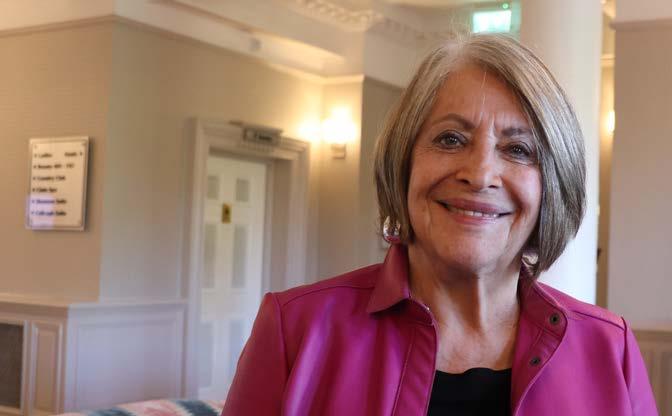
She told us: “We cannot forget
about inequality – we have to link environmental with reducing inequality and the big social gaps affecting minorities, women and the poor.”
Scan the QR code to hear (it's short) how passionate she is.




rural communities are
local institutions and get their leaders working for the community.
and empower local leaders and connect them with
doing great work.
small and don’t try to turn
mouse into an elephant.
entrepreneurial ecosystems.
wealth locally rather than extract wealth from communities.
engage, engage.
your success stories. And let you tell it, not someone else.
adim Sršeň, Deputy Minister in the Czech Republic's Ministry of Regional Development, says he thinks living in rural area is "sexy". He believes we all should have more pride in coming from rural areas.
The interview took place in Cavan which in September 2022 hosted the OECD's 13th rural development
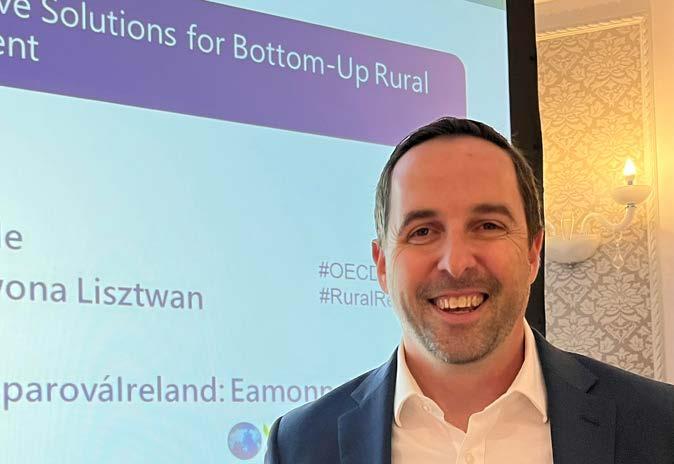

conference.
We asked Minister Sršeň:
1. Are rural policies taking inequality into account enough?
2. What are the key opportunities for rural areas today?
3. What did you learn from the conference in Cavan?
Eamonn O'Reilly, CEO of North East West Kerry Development, was among the 80 speakers in Cavan.
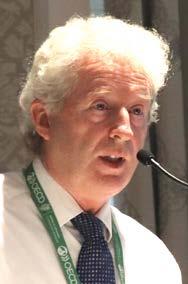
He called for more funding for community capacity building. As an example, he spoke about a LEADERfunded food strategy called 'Bia Dingle' which has since been launched at the Dingle Food Festival.
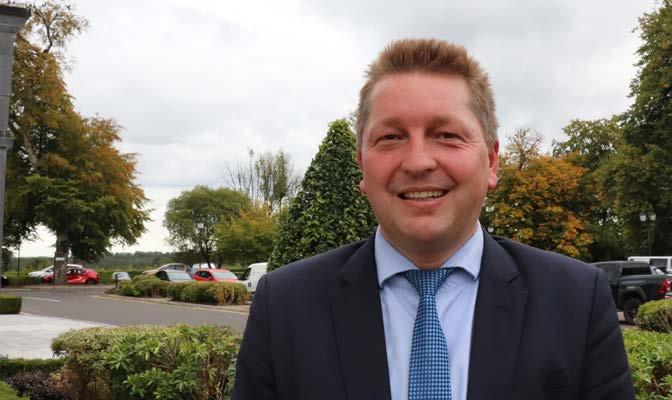
RNathan Ohle is the CEO of the US-based International Economic Development Council. The following are his top tips for rural organisations, as presented during a discussion on 'Effective Solutions for Bottom-Up Rural Economic and Community Development':
Athlone Boat Club recently hosted its first rowing regatta from their new state-of-the-art facility. While the Athlone rowers took home a haul of medals on the day, the new flood-proof and accessible building sparkled in the sunshine and probably was considered the overall winner.

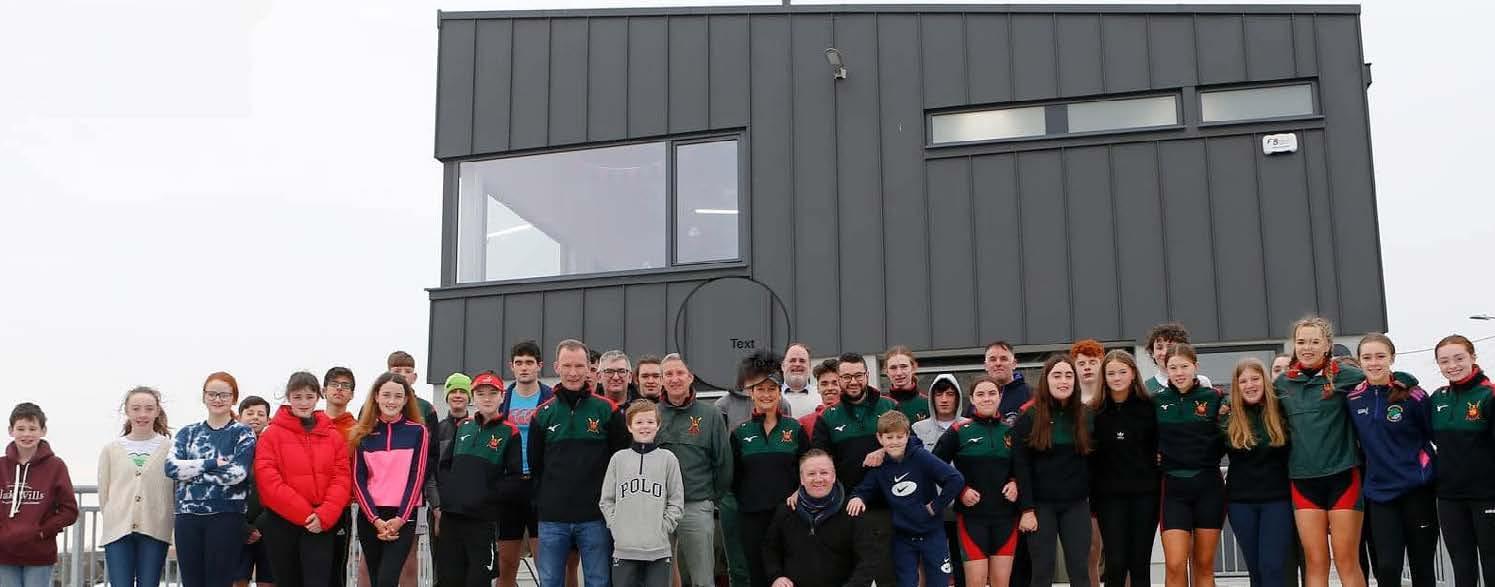
Designed to house boats and equipment safely while meeting the needs of rowers of all abilities and ages, the club’s new headquarters, in front of Custume Barracks, offers superb views of the town from the banks of the Shannon.
Paul Donovan, club chairperson, said, “People were forever talking about a new club. The club we had was in a state of disrepair and was constantly flooding and parts of the club wall were leaning towards the River Shannon. What we have now is a state of the art community facility.”
The new club house stands a metre higher than the original building.
Athlone Boat Club had to overcome significant planning and logistical challenges to bring the new headquarters to fruition, including managing increasing costs and project overruns. As with other community projects across the country, Covid-19 was a disrupter – shovels were put down, meetings were postponed and it tested the group’s resolve.
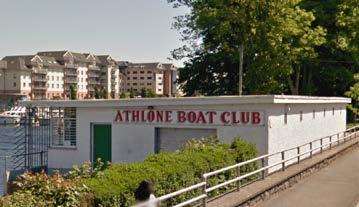
“We had our fair share of challenges, including a real shock when we were told that we were getting a lower grant then we had

expected and in the background costs were rising,” said Paul. “Dealing with Clann Credo was key to this project. They were responsive to all of our requests and changes. I can’t imagine finishing the project without them.”
Having to manage increasing project costs and overruns is not unique to Athlone Boat Club – in fact they have managed a difficult situation exceptionally well. At a recent webinar focusing on how community groups can best manage rising costs, Michael White, an engineer with Feasible Property Development said that a lack of detail at project design stage means a lack of clarity, which leads to price uncertainty.
Michael’s advice is to engage the right professional expertise, develop a detailed bill of quantities and give yourself extra time to think things through.
Back in Athlone - despite all the development work and complexities which took over two years to complete, the rowing coaches somehow managed to stay focused on rowing and continued to thrive on the water with three Irish Championship wins last year, while two young rowers - Donagh Claffey and Martin O’Grady - represented Ireland in the 2021 World Rowing Junior Championships. Well done to Athlone Boat Club!
• ABOVE: The old clubhouse easily flooded.
- How Athlone Boat Club - after decades of talking about it - found the money for a new clubhouse. Clann Credo's CEO Mary Lawlor tells the story.
IT'S EASIER TO ROW WHEN YOUR HQ ISN'T FALLING INTO THE SHANNON
Michael White is an engineer and director of Feasible Property Ltd. He volunteers with Edmondstown Golf Club and Lakelands Football Club including helping with various capital development projects. In a recent Clann Credo webinar on managing increasing project costs, he advised:
1. Identify a group/ sub-committee of members who will handle the project for your organisation
2. Work out your requirements: What does project aim to achieve?
3. Identify the professional expertise required – architects, etc.
4. Prepare a realistic costing. (This is known in the business as the Order of Magnitude cost). For most projects this will require the input of a quantity surveyor or cost consultant.
5. Identify your funding source(s).
6. When the Order of Magnitude is prepared, examine the list of exclusions – development levies, utility connections, etc.
7. Can your community group recover VAT (13.5% / 23%)?
8. Identify the expertise required – eg architects.
9. Identify a realistic timeframe. Projects always take longer than envisaged
10. What statutory consents are required? eg Planning permission/ Fire Safety Certificate, Disability Access Certificate.
11. An accurate budget can realistically only be prepared once the detailed design is complete. (±10%)
12. Identify the procurement process. An agreed tender list is the most common option. No need for more than four to five companies to tender.
13. Agree on a list of tenderers – If they are unknown contact references for details of past projects
14. Detailed specification needs to be tied down as much as possible prior to the issuing of tender documents. Extra weeks spent on this aspect are worthwhile.
15. Lack of detail = Lack of clarity = Lack of price certainty.
16. Input from your quantity surveyor – Requirement for a Bill of Quantities.
17. Are modular forms (built off-site) of construction available?
18. When tenders/ prices are returned from contractors, detailed analysis is required.
19. Request the value of engineering proposals from contractor if necessary.
20. Prior to appointment, agree on the programme and explain to the contractor the importance of adhering to the budget.
21. Identify the Contract Type.
22. Is a fixed price realistic?
23. Your sub-committee's involvement is critical. They need to regularly meet the architect and contractor.
24. Ensure adequate contingency plans are included – generally a minimum of 10%.
25. Update your cost plan/ budget regularly. The involvement of the quantity surveyor is critical.
Identify a project lead and request they email a regular update to your group.
Variations arise – What to do? Tackle them! Is there any way to offset the cost?
Keep your funder informed. If there are any problems advise them.
Pay monthly certificates on time. Any delay means the work on site may suffer. Don’t affect the outcome of your project!
Final Account Stage – Tackle this early. Will you get any reduction for quick payment once the amount is agreed.
• The new clubhouse is one metre higher above the river than its predecessor.

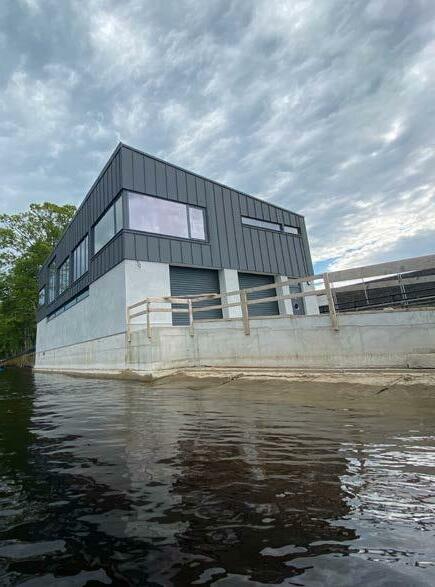
The Rural Social Scheme (RSS) is soon to be reviewed, according to Minister of State, Joe O’Brien, speaking in Cavan on Sept. 28th.
He has responsibility for the RSS and similar schemes which come under the Department of Social Protection. He described the RSS as “an income support measure that engages small farmers in community activity.”
He said the RSS “plays a huge role in including some of the most marginalised people in rural Ireland” and he stated his firm conviction that we must “keep small farmers on the land”.
The low income farmers and fishers on the scheme provide valuable community and environmental services around the country. Despite the challenges, the Minister also sees opportunities and he announced that the review of the RSS that will be “in the context of social inclusion and restoring biodiversity and taking climate action”.
The Irish Local Development Network (ILDN) welcomed its new CEO, Dr Carol Baumann in September.
Dr Baumann joined the ILDN from her previous role as senior manager at COPE Galway, which provides services for people experiencing homelessness or domestic abuse, as well as supports for senior citizens.
She said she was “very proud” to take up the post at the ILDN, and commented:
“The local development companies that make up ILDN engage in powerful and impactful work in communities up and down the country - looking forward to being part of this story.”
Carol is pictured on our page 11 with Donie McGrath.
“You have to see it, to be it” is a strong motto for those seeking social change. Whether it’s sport, business or politics, all walks of life need diversity at leadership level if they are to be truly inclusive, REPORTS JOE SAUNDERS.
The power of role models is particularly influential on young people and there are concerns that Ireland’s youth work sector has not widened the ethnic diversity of its staff to reflect the wider changes in Irish society.
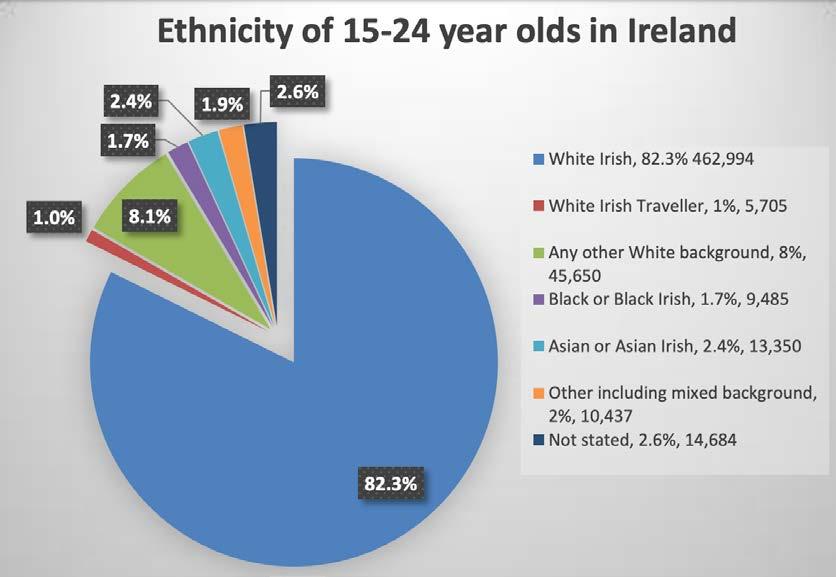
The extent of this lack of progress is about to be measured by a new study commissioned by the National Youth Council of Ireland (NYCI).
The research, due for completion
in November, aims to address the dearth of research on the profile and experience of minority ethnic youth workers and volunteers working in the youth work sector.
It will examine the level of ethnic diversity amongst students attending youth work courses under the North South Education and Training Standards (NSETS) framework and will analyse the experiences of minority ethnic students in placements and in the workplace after graduation.
The research will also gather ideas and recommendations to encourage those from ethnically diverse backgrounds to pursue a career in youth work.
The NYCI says this study is vital and that it will provide “an
evidence base to inform the development of youth work policy and practice and it will also help inform the youth work response to the specific needs of minority ethnic young people.”
The low levels of participation and inclusion of ethnic minority staff in paid youth work positions was previously flagged in the 2017 NYCI report ‘Making Minority a Priority’.
That report concluded: "It seems that minority-ethnic young people and their parents are less likely to aspire to youth and community third level qualifications and careers and as such are more likely to be involved in youth work in a voluntary capacity.”
• These CSO findings are worth bearing in mind when planning to work with young people. The graph is taken from the NYCI report.
Adiscussion paper on
‘Collaborative Governance’ which proposes “a new inclusive approach to state and civil society engagement and solving challenges like housing, care and climate” was launched in Dublin on October 4th.
At the launch, Damien Walshe
from Independent Living Movement Ireland spoke of “consultation fatigue.” He said, “Disabled people experience constant consultation, but see no real impact from their participation in these consultations.”
You can read the paper – ‘Towards a progressive model of collaborative
governance’ - here:
https://bit.ly/3C4Rtnu
It was written by the Irish Community Platform, an alliance of 32 networks and organisations in the community and voluntary sector seeking to address poverty, social exclusion & inequality.
Free Thought FM, the five – year multimedia research project on educational access in Dublin has recently come to a finish, culminating in a thought-provoking free digital book that takes a fresh look at social mobility and educational opportunity in the capital.
Free Thought FM was born out of the 1916 100th anniversary celebrations and aimed to bring an artistic perspective to the subjects of educational access and class inequality across Dublin city and county.
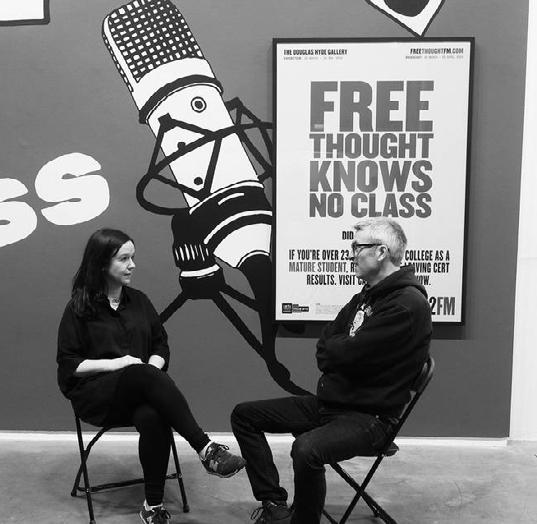
Having explored these issues in the intervening years through the eyes of local young people, educationalists, artists and academics, the project is now winding up with a focus on circulating its concluding publication. It has the no-nonsense title ‘There are Better Ways: Class, Inequality and Free Thought FM' and is available for download at: http://www.garrettphelan.com
It features contributions from sociologist Kathleen Lynch, artist Sarah Pierce, teacher Liam Wegimont and human geographer Gerry Kearns, who each piece together how class and education "shapes and continues to limit, exclude and prohibit young peoples and adults’ fulfilment and futures". They also look with hope at the ways to improve matters and see education as a lever for social change.
Project originator and coordinator is Garrett Phelan, a self-taught artist from Dublin whose credits include exhibits are the National Gallery of Ireland, Project Arts Centre, Irish Museum of Modern Art and as far afield as Buenos Aires and New Zealand.
Phelan says that Free Thought FM began with a simple question – how can things be different?
“This question arose whilst working on earlier projects and I kept coming back to it. In pursuing ways to portray and reflect Dublin, I had many conversations with young Dubliners about the things they were passionate about – there were two barriers that kept coming up again and again, access to education and class inequality.”
He became increasingly aware of the cultural and financial differences that predetermined access to higher education for people in working-class areas.
He used a variety of
methods over the following years to probe the subject with the voices of young Dubliners central to each medium.
One such medium was radio and over a period of 30 days in 2019, Phelan operated a licensed terrestrial radio station Free Thought FM from the Douglas Hyde Gallery in Trinity College that gave a platform to individuals and groups of all backgrounds aged 18–25 to explore and articulate their experiences of educational access in Dublin.
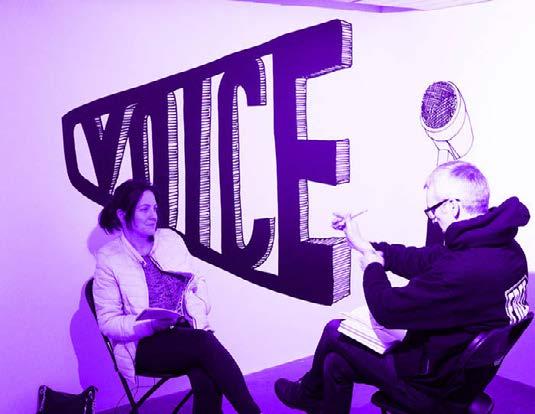
Many other platforms were used such as live street
gatherings.
In seeking to promote the overall findings, Phelan and his fellow collaborators decided to invite key Free Thought FM guests to write up their conclusions and bring these to a wider audience.
Whilst ‘There are Better Ways’ documents many of the downsides of educational structures in Dublin whereby “privilege is enabled to reproduce itself”, it is also hopeful and highlights the transformative power of education.
Over 10,000 copies were circulated in a direct marketing campaign to schools in disadvantaged areas in Dublin.
Kathleen Lynch of UCD sees the potential of education to break this chain of power reproduction:
“Education has great potential to generate new ways of thinking, knowing and seeing the world of it is enabled and facilitated to exercise its own power.”
In this, she follows Paulo Freire and others who show that, despite not able to change power structures on its own, education need not be a site of class reproduction.
As the 2022- 2023 school and academic years get underway, disadvantage and underinvestment in education has come into focus as parents count the cost.
‘There are Better Ways’ provides a provocative and alternative look at the issue through a lens that shows that positive change is always possible.
Maybe it even had an influence on the Government's decision to introduce free books for all primary school pupils. Next up - secondary schools.
Check out the website: http://www.freethoughtfm.com/
"I
many
with
about the
kept
Killarney Men’s Shed hosted a visit in July by Minister of State for Community Development, Joe O’Brien.
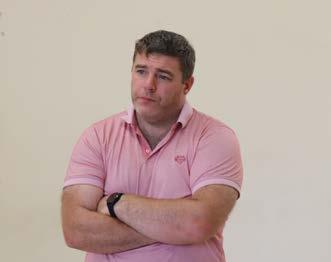
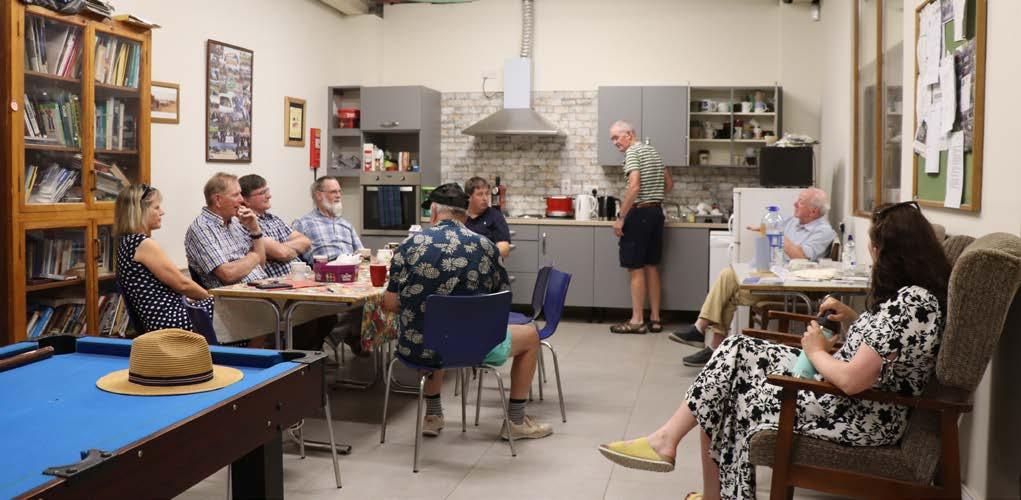
Smile and the whole world smiles with you:
I tried that and it didn't work. Some day soon I must take off the mask.
Become a buddhist:
If you can't afford a houseor petrol, or food - in this life, there's a fair chance you will in the next one. Or the one after that.
Christmas is coming, but you can ignore it:
- Unless you're under-12, I recommend you skip Christmas this year. Just don't bother. Save money. Save a turkey. Save the forests. It'll come around again next year and the year after. Am I repeating myself here? I am, aren't I?
Believe in community development:
It works. Collective Action. Empowering yourself. Seeking change (does that mean loose coins?).
I took collective action over my ESB bill. I consulted the family next door and asked would they like to pay my bill. They declined. I asked everyone on the street. All were rather negative to my proposal. I then told the ESB that we weren't paying and now I'm waiting to see what move they make next. If there are going to be blackouts anyway, what's the point.
Start donating to War on Poverty:
Everyone seems to be prowar these days. I'm not gone on it to be fair.
But I do hate poverty and to stay fashionable, I now donate €2 per month to 'War on Poverty'.
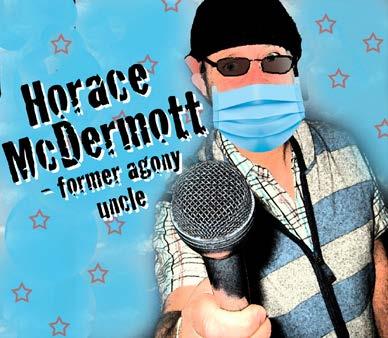
Take that, poverty!
Killarney’s shed is one of the longest established in the country and surely one of the best equipped. It was set up in 2012 by former chair Tom Douglas and others from the local area with support from South Kerry Development Partnership.
It is located in a former box factory where the men have built
workshops, activity rooms and a comfy kitchen café, while outside are well-gardened grounds.
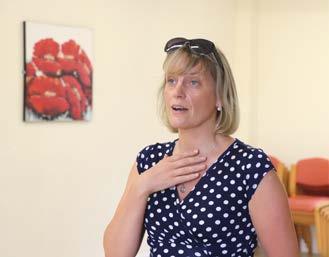
Shed members were out in force for the Minister's visit. He also visited other projects in Co. Kerry –more of which in our next edition.
In the meantime, if you're wondering how to set up a shed, the Irish Men's Sheds Association (IMSA) says there are five steps a group needs to take.
STEP 1: Hold an information evening.
STEP 2: Form a working group.
STEP 3: Find a suitable premises.
STEP 4: Get insurance.
STEP 5: Plann and register with the IMSA.
To learn more, visit: https://menssheds.ie/setting-up-ashed/
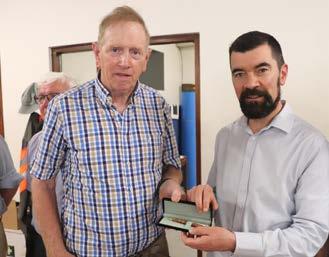
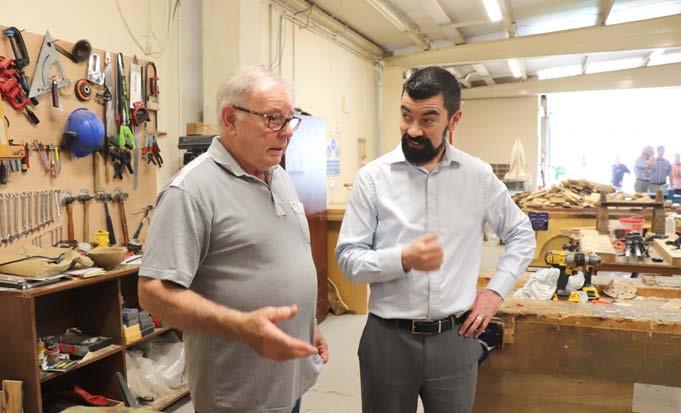 PHOTOS BY A. MEAGHER
PHOTOS BY A. MEAGHER
They're a bit fruity down in Kerry, but that's not news to anyone outside the Kingdom.


Now they have reached new heights in terms of fruitiness as Tom Douglas and his colleagues from Killarney Men's Shed, one of the oldest and best sheds around, have grown a pear tree that towers above the heads of admiring onlookers. Apart from specimens in botanical gardens in Dublin and Belfast, it is probably the biggest pear tree in the country.
"They said five years ago that it couldn't be done," said a beaming Tom as he led me into the polytunnel. That day it was 32 degrees celsius outside and even hotter inside. Tom pointed to the dry earth and to leaves turned brown and tut-tutted that his colleagues hadn't watered their pride and joy. And so we set to work in close to 40 degrees heat to replenish its roots.
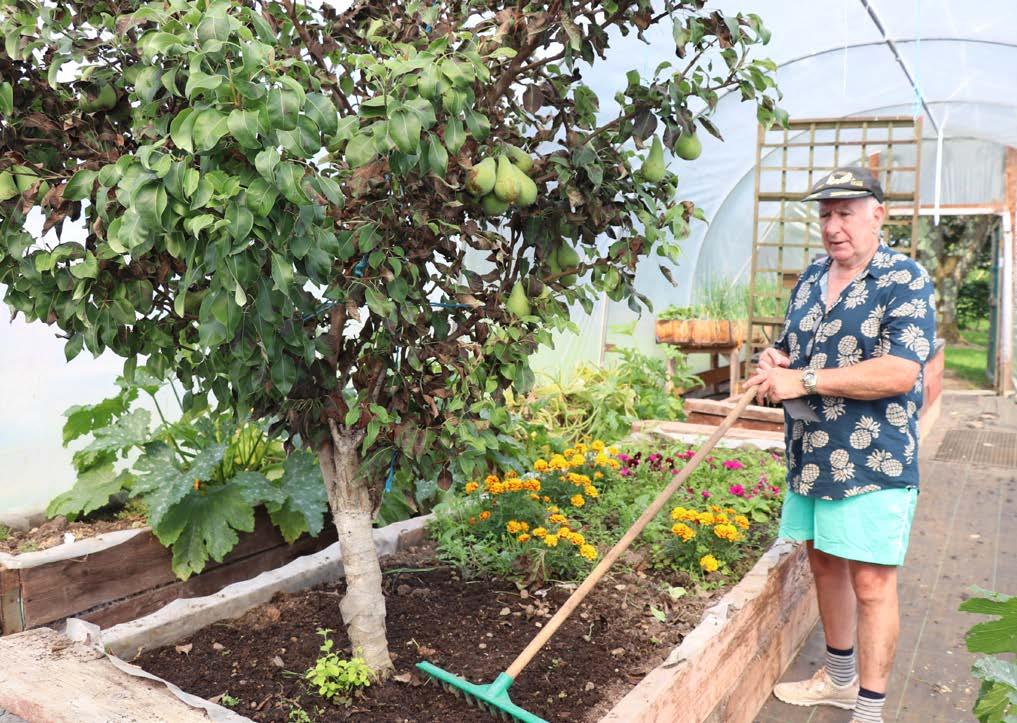
That earned 'Changing Ireland' an invite to the Killarney Men's Shed's annual Pear Party held in September.

"My wife makes pear tart and the boys go bananas for it," said Tom.
As mentioned, they really are a bit fruity in the Kingdom. Keep watering that tree and we'll be down next year!
For 2023, the budget provision
•
•
•
•
•
•

In its analysis of the education measures announced in Budget 2023, Inclusion Ireland welcomed the reduction of the pupil-teacher ratio to 23:1.
However, the organisation said it was “very concerned” about the Special Needs Assistants (SNA) allocation.
“Although 1,194 new SNA posts were announced, there are only a percentage going towards mainstream education. We need to get the balance right if we are to build towards an inclusive school model so that all children can go to school together.
further investment in the extended summer programme.
Inclusion Ireland added that it hoped the funding announcement for the National Council for Special Education and additional SENOs “will mean that more children will be supported locally and that communication between schools, families and SENOs will improve”.

Inclusion Ireland, the national association for people with an intellectual disability, surveyed 458 people before the budget.
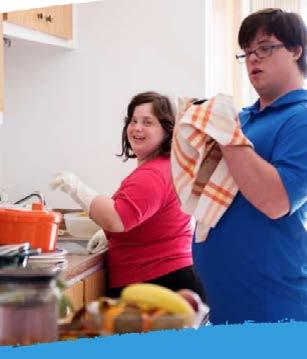
Their research findings, shared with the Government in advance of the budget, helped identify six issues.
The survey found that the top three issues for people with intellectual disabilities are:
1. Housing and community living - 38%.
2. Access to services - 23%.
3. Decision making - 21%.
BY J. SAUNDERS, K. MASTERSON & A. MEAGHERThe much-anticipated Budget 2023 was unveiled in late September with the country facing the highest rate of inflation seen since the 1980s.
Presenting the Budget to the Dáil Chamber, Finance Minister Paschal Donohoe announced that it was a “‘Cost of Living Budget’, focused on helping individuals, families and businesses to deal with rising prices.”
In the days that followed, there has been much debate on whether Budget 2023 will achieve that goal. A number of organisations operating in the community and voluntary sector have given their analysis of the budgetary measures most relevant to their members.
"We also need to see more investment in therapy teams for schools to support children to access their right to education. We need to move beyond pilot programmes and into sustained investment in our schools so that children get the support they need in their local school,” said an Inclusion Ireland spokesperson.
The organisation welcomed the announcement of the free primary school books scheme, and the
Social Justice Ireland said a "new social contract" is needed and that Budget 2023 should be guided by one core principle - the protection of the poorest in Irish society.
SJI recommended that this new social contract "should have five core goals: to deliver a vibrant economy, decent services and infrastructure, just taxation, good governance and sustainability. Crucially, however, these five outcomes must be addressed simultaneously”.
The organisation also proposed a €477 million package under the Budget's Regional, Rural and Community provision. This included a call for additional supports under the Community Measure for Public Participation Networks (PPNs), the Social Inclusion and Community Activation Programme (SICAP), the Community Services Programme (CSP) and LEADER.
Social Justice Ireland (SJI) believes that Budget 2023 will widen “the rich/poor gap by €199 next year”.

A statement released by the organisation said: “Despite the welcome temporary measures to address the cost of living and energy crisis, in the long run this Budget will be seen as regressive and unfair. While one-off measures are welcome, when they are gone, they are gone. What we are left with is a skewed distribution of resources that favours those on higher incomes.”
According to SJI, a €20 increase in core social welfare rates was the minimum required to keep up with “anticipated inflation for necessities in the coming year”, and to achieve “benchmark rates to 27.5 per cent of average weekly earnings over a two-year period” which was the target set by Government in 2007.
Meanwhile, the top three priority issues for family members were:
1. Access to services - 50%.
2. Poverty and the cost of disability - 27%.
3. Education - 17%.
It said in its pre-budget submission that it was especially concerned about poverty, the cost of disability, housing, education and access to services.
More info:
https://inclusionireland.ie
“Gambling with the lives of Ireland’s poorest and most vulnerable is totally unacceptable. Government should reverse its decision on core welfare rates and increase these by €20 a week in the upcoming Social Welfare Bill. Anything less would mean that Budget 2023 confirms the Government has abandoned those who need its help most,” the SJI statement added.
The organisation was also critical of the Government’s “focus on one-off payments”, which it says “cannot tackle the embedded low income culture that has prevented our republic from eliminating poverty”. SJI pointed out that a total of 595,000 people in Ireland are living in poverty, of which around 164,000 are children.
SJI’s full budget analysis is available to read at:
https://www.socialjustice.ie/
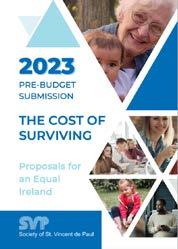
The Society of St Vincent de Paul (SVP) says that while there are some welcome aspects to Budget 2023, the one-off measures won’t stem a rise in poverty.
SVP said that the cost of living package will help people get through this winter, however next year people on low incomes will be “pulled further into poverty due to inadequate social welfare increases and a failure to increase or expand the Fuel Allowance to families on the Working Family Payment”.
Dr Tricia Keilthy, SVP Head of Social Justice said the cost of living measures such as the one-off Fuel Allowance payment and double social welfare payment will help lowincome households during what will be a very difficult winter, but they are only temporary. The increases in core social welfare rates do not cover the rise in the cost of living. This means a real-term cut to welfare for those already living below the poverty line.
“The failure to address the impact of inflation on low-income households beyond short-term measures puts many people at risk of being pulled further into the kind of grinding daily hardship that is very difficult to escape," she said.
Dr Keilthy continued: “The decision not to extend the Fuel Allowance to those in receipt of the Working Family Payment is very disappointing. This is a targeted measure that would have benefited just over 50,000 low-income families and protected them over the winter months from going without adequate heat and light.”
Welcoming the extra temporary payments for carers and people with disabilities, SVP nonetheless regrets that the Government did not introduce an ongoing weekly cost of disability payment.
With 70% of calls to SVP coming from households with children, child poverty is a pressing issue for the organisation.
SVP said the increase in the thresholds for the Working Family Payment was welcome, as is the increased investment in childcare will benefit many families. However, it is concerned that the increased investment won’t reach the most disadvantaged children.
The charity says the double child benefit payment is poorly targeted.
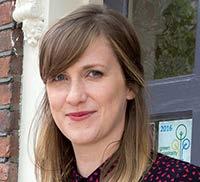
On education, SVP said the
increase in support under the SUSI scheme is positive, but it won’t be enough to address the real cost of attending third-level education. Since 2011, that cost has risen by 25%. It still wants access to SUSI granted to those studying part-time.
SVP welcomed steps taken to address school costs. It received up to 30 calls per hour in August from parents worried about school costs.
Rose McGowan, SVP's national president said: “For many families fees, uniforms, transport, books and digital tools are a source of constant stress. The decision to provide free school books to all children in primary school is very positive and is something we have campaigned on for many years.”
On housing, SVP says the best way
to ensure stability and security for individuals and families is to increase the supply of social and affordable homes and it wants Housing for All to deliver on its commitments. However, it says the overall budget allocation for homeless prevention is inadequate.
The Society of St. Vincent de Paul (SVP) cited a weekly gap of €49 between core social welfare rates and the cost of a minimum standard of living, and pointed out that some 200,000 children are now living in deprivation.
Dr Tricia Keilthy, SVP Head of Social Justice said:
“Investment in essential services like housing, childcare and education must go hand in hand with a social protection system that is strong enough to keep people out of poverty while out of work, living with an illness or disability, caring for a loved one, on low pay or in retirement.”
Dóchas welcomed the Budget increase of €177 million for overseas development assistance (ODA), which brings the overall ODA budget to over €1.2 billion.
The organisation said that with this announcement, the Government “have also shown their commitment to reaching the UN target of 0.7 per cent of gross national income (GNI) spending on overseas development by 2030”.
CEO of Dóchas, Jane-Ann McKenna commented: “The money allocated shows that the Government is committed to fighting hunger, conflict, and addressing the climate emergency. Increased investment by Ireland is vital to tackling the severe
food crisis in the Horn of Africa, where one person is dying every 48 seconds. It is also vital for a just recovery in the face of Covid-19 and the climate crisis.
“Irish International NGOs, supported by Ireland’s ODA programme, are on the frontline in over 104 countries, working in partnership with local NGOs, community workers, and activists to provide long-term sustainable development and live-saving assistance.
"This commitment to ODA by the Government, and its leadership on these issues at a global level, is needed now more than ever," she said.
Dóchas is the umbrella group for Irish international development and humanitarian organisations. It sought an allocation of €223 million more for the overseas aid in Budget 2023.
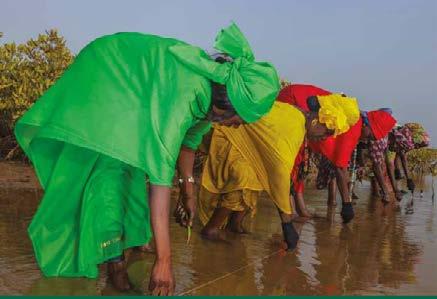
This was to help see that "universal human rights and minimum standards are being fulfilled, including access to food, water and healthcare".
It noted that the "extraordinary global events" (such as war, climate change, and Covid-19) mean more challenges, especially for people in countries that were already experiencing humanitarian crises.
The organisation recommended that the increased funding go to: fighting hunger, tackling the climate emergency, addressing conflict and responding to the Covid-19 pandemic, and that it should be delivered to civil society groups, particularly women’s organisations.
Dóchas criticised the State’s progress on its commitment to providing 0.7 per cent of Gross National Income annually to Overseas Development Assistance. It currently stands at 0.32 per cent.
Dóchas also called on the government to use its influence in its remaining few months on the UN Security Council to push for greater action on the structural causes of extreme poverty, inequality, conflict, the climate emergency and hunger.
The Irish Traveller Movement welcomed a number of initiatives, but warned that they won’t address the investment advocated for to support Traveller inclusion, and to improve outcomes, especially in the areas of accommodation and housing, and education.
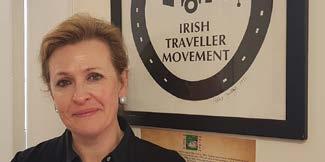
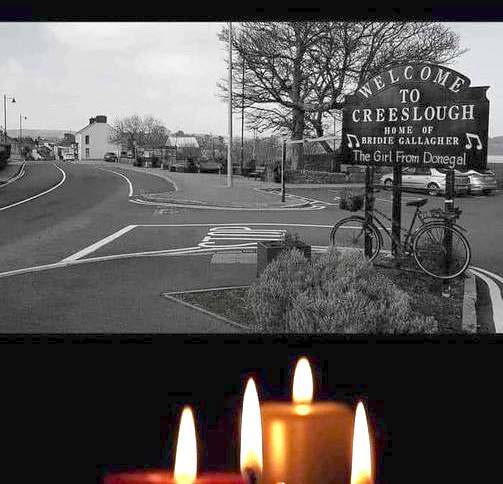
Jacinta Brack, ITM Political Advocacy, Communications and Policy Coordinator said: “Despite a €2 million increase to Traveller accommodation this year, the allocation for the five-year programme will be approximately €82 million, compared with €127 million for the first programme, resulting from local authority underspending and under delivery.”
The ITM also stated that the lack of any commitment to resource and establish the Traveller Accommodation Authority, to oversee Traveller accommodation delivery, and redress chronic overcrowding and homelessness was
a cause of concern.
“It is difficult to understand the rationale for the paltry increase by five per cent, amounting to €283,000 for Traveller and Roma initiatives, to the scale of investment needed, and which also does not address the increases in energy, cost of living and knock on effects on staff recruitment and retention, and in view of pay parity inequity in statutory funded organisations,” added Ms Brack.
With regard to education, ITM said that fundamental measures to bring Traveller pupils into equivalence with other learners are not evident, and a Traveller Education Strategy called for since 2006 to be resourced with dedicated staff, has not been included.
In 2020/2021, just 33 Traveller students started undergraduate degrees, however, there is a plan to increase participation levels to 150 via a three-year pilot of €450,000
per year.
Ms Brack warned that “without vital attention to the retention of Travellers in post primary, the gateway to third level, early school leaving continues”.
An incentivised scheme via a higher rate of Jobs Plus subsidy for employers hiring candidates from disadvantaged and minority backgrounds has the potential to bolster diverse recruitment.
But, ITM noted that the Programme for Government commitment to a Traveller employment action plan has not been forthcoming, and believes that the portion of the 5% increase of €283,000 to be shared with education supports will not address the 83% unemployment rate in the community.
ITM said the first investment by the State towards Traveller mental health was significant, with Travellers
now included in a €7 million package to expand community and residential addiction services, and to improve access to healthcare service.
However, “further clarity on those measures and allocations is needed, such as whether ring-fenced and distinct actions for Travellers are promised, including measures to address suicide in the community, rather than a reliance on inclusion within mainstream services, which has not remedied crisis points to now,” according to Ms Brack.
The Irish Traveller Movement’s Pre-Budget Submission titled ‘Progressive Realisation for Travellers of Budget 2023’, is available on their website:
https://itmtrav.ie
Davidia involucrate, also known as the dove tree. This is the name of a tree planted by Ukrainian refugees in the garden of the Earl of Desmond Hotel, in Ballyseedy, Tralee, Co. Kerry.
"By planting this tree we would like to wish peace for our Homeland, and to express our deep gratitude to Irish people for their kindness and hospitality. They made huge difference in our lives,” said Tetiana Tymchak, a Ukrainian volunteer who led the initiative.
“Hotel staff work very hard every day for us. We feel welcomed and cared for. That moves us to tears,” she said.
To buy the tree, Ukrainian hotel residents gave donations.
The event occurred on Ukraine’s Independence Dayon Thursday, August 24 - and followed a concert performed in the hotel yard by Irish and Ukrainian singers. On that day, the refugees wore national embroidered clothes and held Ukrainian blue and yellow flags.
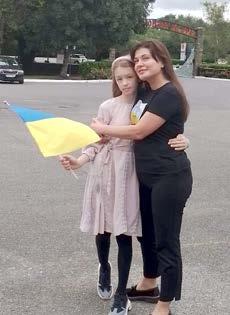
Planting the tree, kids and adults sang the patriotic Ukrainian song "Ой, у лузі
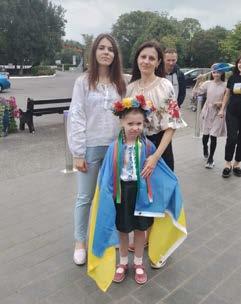
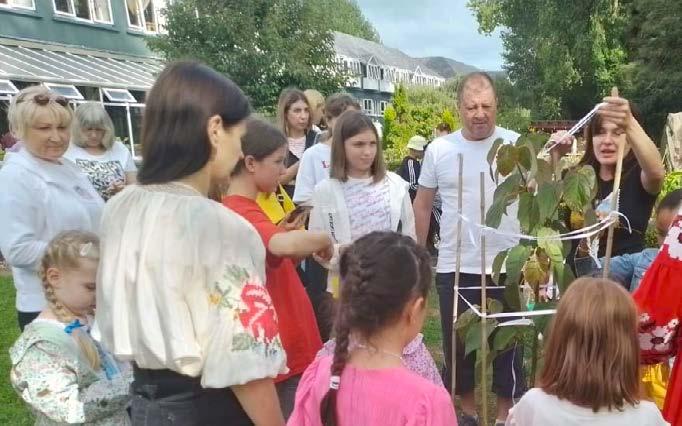
червона калина" (English title – “Oh, the Red Viburnum in the Meadow”). This old song gained international attention after the Russian invasion of Ukraine started. The red viburnum (in Ukrainian - the “chervona kalyna”) is a national symbol represented throughout Ukrainian folklore. The song by itself became a symbol of courage and bravery of Ukrainian people in their fight for independence.
It is interesting to know that davidia is a very rare tree. It is named after Armand David, a
French missionary and naturalist. Victoria Keane, who works at Liscahane Nursery and Garden Centre, said a monk brought this tree to Europe from China in the 1800s. Davidia flowers have big beautiful white petals which look like dove wings. That is why it is also called the dove tree. And, as we know, the dove is a symbol of peace.
Davidia planted in the hotel garden will bloom the next year. While the tree does not have flowers, Ukrainian children and adults decorated it with hand-
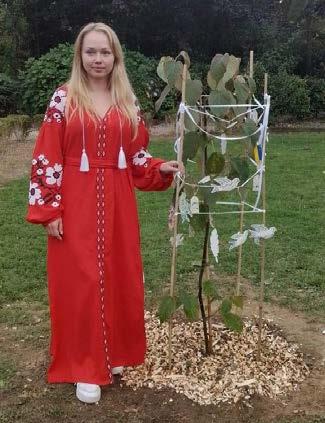
made doves. The most they want now is victory and peace. Peace for their country and peace for every heart. As the song goes:
“Oh, in the meadow a red kalyna has bent down low,
For some reason, our glorious Ukraine is in sorrow.
And we'll take that red kalyna and we will raise it up,
And, hey - hey, we shall cheer up our glorious Ukraine!”
* Olesya Vasylenko is a journalist from Kyiv who now lives in Co. Kerry.
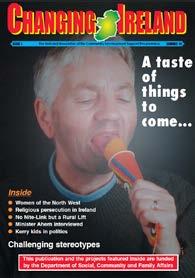
• 21 YEARS CELEBRATIONS: Board members Andrew O’Byrne and George Clancy, editor Allen Meagher, student on placement Caoimhe Lalor, founding member Viv Sadd, Minister Joe O’Brien and journalist Kathy Masterson in our office in Moyross on Oct 10th.
Minister of State for Community Development, Joe O’Brien, visited Changing Ireland in Moyross on Oct 10th, as the magazine celebrated its 21st birthday.
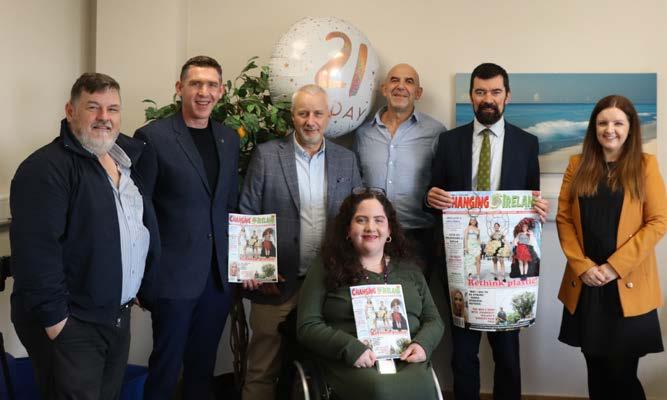
The Minister congratulated Shane O’Sullivan and his board and staff for managing and supporting the project. He said,
“‘Changing Ireland’ has a track record in promoting community development, giving marginalised communities and people who are hard to reach a voice, and highlighting positive
local and national initiatives. It is also at times critical and that is to be welcomed.”
Welcoming the Minister, who was on a twoday tour of Limerick city and county, Shane O’Sullivan, chairperson of Changing Ireland Community Media CLG, said, “Our work is underpinned by Community development principles". He thanked readers and all involved, past and present, adding that 'Changing Ireland' was a trusted and valued news source.
Editor Allen Meagher recalled how activists
in Moyross took on the publication as they saw value in a national media project to highlight positive community initiatives in areas dogged by tabloid media coverage of crime.
The magazine was set up with support from the then Dept. of Social Welfare to give a voice to those communities, to highlight good things happening on the ground and to champion community development.
"Ilovechildren and I love people so much," says Hanna Buhaiova (pictured right) a Ukrainian teacher and businesswoman. Hanna was changing her city - running her family club for kids and adults. Languages, arts, crafts, games – young and mature club participants were busy and happy. So were Hanna and her staff.
But the Russian invasion destroyed everything. Hanna had to stop the work she enjoyed so much and flee her homeland. Our guest tells what helped her to survive and what are her hopes for the future.

Hanna please tell us a little about yourself.
Hello. I am Hanna from Ukraine. I come from a family of ethnic Ukrainians who were forcibly relocated in the 1930s to special settlements in the remote areas of the Soviet Union by Stalin. So my Mom was born in Siberia. After deportation, her parents - my grandparents - were sent back to the eastern part of Ukraine, to a small town in Kharkiv region where I was born. So, I spent my happy childhood in that small town. There I finished school and dreamt about my future adult life in the big city - Kharkiv. So, after finishing school I went there to fulfill my dreams and to start my adult life.
You mentioned Kharkiv. It is a very beautiful Ukrainian city. Could you please tell more about it?
Kharkiv is one of the biggest Ukrainian cities. It is located in the east of Ukraine. It is an exceptionally beautiful and developed contemporary city. It is a major industrial, cultural, scientific centre in Ukraine. Kharkiv can boast of its big number of educational institutions, universities, more than 60 higher educational establishments, schools, theatres, cinemas and its impressive network of educational research institutions.
It is a lovely place where lots of events, exhibitions, festivals are held every week actually. It is the city which hosts lots of foreign professionals, people of culture and science. It is painful to talk about my lovely favorite city, my homeland. And, as you can hear, I am talking about it in the present time. I am telling it IS beautiful, it IS lovely, for me it IS in my heart. But as you know now it is being attacked with Russian bombs and rockets.
And actually there is not one educational institution, school or university which is not damaged at the moment by Russian bombs and rockets unfortunately. But it is alive for me at this moment and will be
forever.
Tell us about your profession. What did you do in Ukraine?
I had the job of my dreams after I graduated from two universities, firstly in teaching, secondly in finance. I combined these two professions to do one job and I had my own business. I have two children but my business was my third child. I ran a family club in Ukraine where we provided our customers with services like extra-curricular activities for kids after school, some language courses, arts, crafts.
Why did you choose these two professions?
It was not accidental because I dreamt about teaching and I dreamt about something creative, something I could do on my own, where I could implement my ideas and my vision of education. Because I love children and I love people so much. I love watching their growth and their progress in everything. In my club we provided courses, for example, for adults who started learning French or English from zero.
It was amazing to see how the person makes progress day by day. How happy the kids were with the results they get in arts, crafts or languages. This is because I had very good staff, very professional teachers in my club. We felt like a family, like one team, and not only with my staff, but also with my clients. We interacted a lot. We spent lots of events together and played lots of smart games together. We spent a lot of time developing our personalities and the personalities of our customers. So my business was my love, it was my child. This is what I can say about it.
And now unfortunately this job of your dream was stopped and destroyed by Russian invasion.
Yes, that’s it. You know I can't say it without a deep pain in my heart because the premises which I rented for my family club are still in Ukraine. They are still there and everything I bought - all the games, all the materials, all the furniturewere purchased with love. They are partially damaged unfortunately. So this is my pain. The premises are empty now, but before they were full of people, full of children, full of joy, full of happy sounds, happy voices... So of course it's very painful, and I understand lots of people feel the same.
What did you feel when you heard the first explosions in your city?
I remember that moment. First of all it was unbelievable. But maybe I couldn't realise at that moment it happened actually. I felt disappointment. Disappointment in the people who started all of this. I can't name them people because they are heartless. I can't even describe it. It's so difficult for me. So disappointment, yes. After I felt angry. Then I felt desperate.
Desperate because I could not stop it. I couldn't influence that horrible war after understanding it really happened. We could see the evidence of it. And concerned for my family I felt responsibility to do something - to take action and to save my children’s lives. It's really hard to describe the mixture of feelings I had. It was like a bit of a mess in my soul at that moment. Maybe now I can realise it. I can think more and understand what happened then.
So you decided to leave your country?
Yes. After a week of spending time in a basement and watching the horror of the war, watching the bodies of dead people on my street, watching the awful conditions of living in the basement, I decided to leave to save my children first of all. So, I packed what I could in my suitcases, took my children to the station and left Ukraine.
It was hard to leave at that moment because the city was being bombed and we couldn't take a taxi since it was very dangerous. And when we were waiting for evacuation train, Russians attacked the centre of the city with rockets badly. The walls of the station were shaking and it was horrible. And people were scared of this. That is the moment I remember.
When we got on the train I couldn't even feel relief. I saw the children and women had a tremor in their hands because of this fear. The conditions were really bad because it was 15 people in each little compartment including little babies and older children. And there were lots of foreign students in the train who had to leave and who shared their emotions with me. They too cried because they had to leave
• Hanna Buhaiova in Co. Kerry. Photo by Olesya Vasylenko.
Photo by Olesya Vasylenko.
Ukraine, had to leave our beautiful city Kharkiv because of this horrible war. And during the time they studied at our university they loved Ukraine as their homeland. And they really cried. For me it was the most touching moment when I left my homeland.
What helped you to survive and stay strong during those difficult weeks?
Well, maybe the feeling of responsibility because I have two
children. I had to be strong, I had to show them my courage. I had to be brave enough to move forward. Because the most precious thing in our life is our life actually. And I explained to them that once you stay alive you can do anything. You can be a real human, you can develop yourself, your strong sides. I believe that our homeland Ukraine will survive and win this horrible war. Actually, I am sure we already won. Everyone can see it. So, maybe only my belief and my responsibility helped me to survive. Understanding that the truth is on our side also helped me to move forward.
And what are your hopes and expectations for the future?
My hopes and expectations for my country is returning all our Ukrainian areas. Because this is the historical truth. Only this way we will finish this war. It’s banishing all Russian [occupants] from Ukrainian areas.
Ukrainians, for people who support us, who help us in these hard times - I wish them lots of love and only peaceful life. I wish they never know what the war is, never see its face, never feel its smells, never hear its voices and sounds. Be happy and loved.
I wish them lots of love. I wish them peaceful life as I said before. I want to express my huge gratitude to all of them, to every Irish person for their big support, for their understanding, for their lovely admiring smiles in the streets, for their hugs, for any help they do for us. I am really, very grateful. They are amazing people. It’s an amazing country and I hope they all will be happy.
Thank you very much for this interesting interview. I sincerely
Also, I believe that all our beautiful amazing modern cities will be rebuilt and revived.
For my family I hope to reunite with my husband who is still in Ukraine for very important reasons. For people who are currently staying in Ukraine - I wish them to stay safe and alive. Once we are alive we can do everything. There are no borders for Ukrainians because we are full of dignity, we are real hard workers and we love our motherland. If we stay alive, if we survive, we will do everything. We will rebuild our beautiful country, I believe that strongly.
And for people who are not
wish that your hopes and expectations come true.
Thank you very much. And the same for you.
Thank you!
"For people who support us, who help us in these hard times - I wish them lots of love and only peaceful life. I wish they never know what war is, never see its face, never feel its smells, never hear its voices and sounds. Be happy and loved."
"I had the job of my dreams. I ran a family club in Ukraine. I love children and I love people so much."
Alist of the successful applicants for funding to upgrade community centres under Category 1 of the new Community Centres Investment Fund was published on October 12th.
It came as part of an announcement by Minister for Rural and Community Development, Heather Humphreys, that over €12.5 million has been allocated to upgrade almost 600 local community facilities in both urban and rural areas.
The new fund will support groups to carry out refurbishments and improvements of community centres, sports clubs, parish halls, youth centres, men’s sheds and facilities used by elderly people, among others.
Grants of up to €25,000 are being provided for Category 1 projects.
Minister Humphreys announced the funding during a visit to Fettercairn Community and Youth Centre in Tallaght, which received funding in the first tranche.
She said, “The local community centre is at the heart of our towns, villages and parishes all across this country. I want to support these great local facilities and that’s why I launched the new Community Centres Investment Fund earlier this year. The level of interest has been unprecedented."
Works that will be carried out include upgrades to heating systems and kitchen facilities, better disability access, essential maintenance works such as roof repairs, works to provide additional services and the development of social hubs.
"Further funding announcements for larger scale projects" were to be announced "in the coming weeks", said the Department.
"The Community Centres Investment Fund represents the largest single investment in community centres in decades," stated the Department.
The list of successful projects under Category 1 of the fund is available under "Community Centres Investment Fund Successful Projects" on: https://www.gov.ie/
The Irish don’t forget their history. That’s the impression I got when I came to Ireland and found out more about its history. It is very important to remember your history. It will help to prevent future tragedies that happened in the past. I found out there were extremely sad pages in Irish history such as famines.
So I decided to tell you the story of a Ukrainian mother and daughter Halyna (90) and Svitlana (66). I think many readers here in Ireland can relate to what they’ve told me. Halyna and Svitlana remember well the times of great upheavals in their Homeland.
Halyna was born in the Sumy region (northeast of Ukraine) in a family of peasants. Her grandfather lived in a homestead inherited from his father. The family had a big garden with apple and pear trees.
“There was no such a big garden in the whole area,” Halyna recalled. Her grandfather’s brothers lived on the same street. Before the Russian Revolution he owned a lot of land. Her grandfather, Halyna said, was a very industrious man who reaped great benefits from his hard work. The family had a big field. In half of it they planted potatoes and other vegetables. In the other half they grew wheat and rye which gave a decent harvest.
During difficult times in his country, Halyna’s grandfather tried to save grain for the future. So he put vats in large pits dug out in the earth and covered them with wooden boards and dense homespun
tablecloths. In those hidden vats, Halyna tells, the grain was stored.
The Famine - the Holodomor - which came upon the land of Ukraine in 1932 brought great distress. Starvation was caused artificially by Stalin regime. According to a recent study "Genocide of Ukrainians in 19321933 based on the materials of pre-trial investigations", the number of victims of the Holodomor is 10.5 million people. It was terror by famine.
Soviet government representatives came to each house and took away all the grain from Ukrainian peasants.
It was almost a miracle the wheat hidden in large vats in the earth wasn’t found out. Halyna remembers that time. Her mother got up at four o’clock every morning. She stoke the stove and baked bread for the family. Later, going to work, she cut off half of a fresh loaf and handed pieces out to her relatives who faced starvation and could hardly move.
To survive, they also picked meadow flowers near the river, ground them and baked so called ‘bread’. It looked like a loaf but it hardly gave any nutrition.
While Halyna’s mother rescued their relatives from starvation, unfortunately, Svitlana recalls, the family couldn’t help other people in the village. Her grandmother was afraid the grain would be found and taken away. So she gave bread only to close relatives who wouldn’t tell their secret.
When the Second World War started, Halyna’s father went to the front. Three sisters stayed with their mother. Difficult times came again and people began to steal sheaves of wheat in the fields. So her mother spent nights sitting near her sheaves and guarding them. In the mornings she had to go to work.
Occupiers conscripted young
"I love to listen to life stories of people who can inspire and teach something," says Olesya Vasylenko.
Olesya is from Kyiv, Ukraine, and now lives in Co. Kerry. For the last 20 years, she worked as a radio host, editor and correspondent. She and other media workers on Russia's hitlists fled for their lives when Putin's troops attempted to storm the capital.
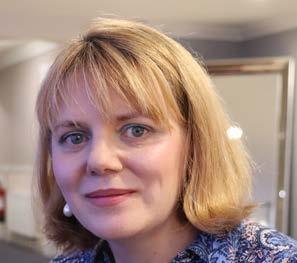
She shares all the challenges that other refugees face and we welcome her reporting for 'Changing Ireland'.
Ukrainians for forced labour in Germany. To avoid this, Halyna’s older sister and her friend hid in the woods. As Svitlana recalled, their mother brought them food. She did it at night so no one would see. Because partisans put up a resistance, German occupiers conducted raids throughout the area. They controlled the locals to stop them bringing food to partisans.
One November night, Halyna’s mother, as usual, went to the woods to feed the girls. To get there she had to go through riverside meadows with large water-filled pits made by explosions. Suddenly she heard the sound of a German car. She jumped into a pit and stood in ice-cold water for a long time waiting for the Germans to leave. Halyna was happy that her mother didn’t drown and didn’t die of hypothermia.
During the Second World War, as Halyna tells, her father was wounded three times. But his ingenuity helped him to survive at the front. During
•
the war it wasn’t always possible to deliver provisions to soldiers and they starved, so Halyna’s father cut the meat from the slaughtered horses and cooked chowder for himself and for others. During the (WWII) battle for Kyiv’s liberation he received a heavy injury. Despite being seriously wounded he ran and after covering a distance he fainted and woke up in a different city. He was taken to the hospital where he spent a lot of time recovering.
After so much hardship, Halyna and Svitlana never thought that war would touch their lives again. That they, in their 90s and 66, would flee its horrors to another country. They took a very long journey to Ireland.
The women don’t know what the future holds for them but at least for now they are safe. Halyna and Svitlana are very thankful for the love and care they receive here in Ireland. The Ukrainian mother and daughter pray for all their benefactors every evening.
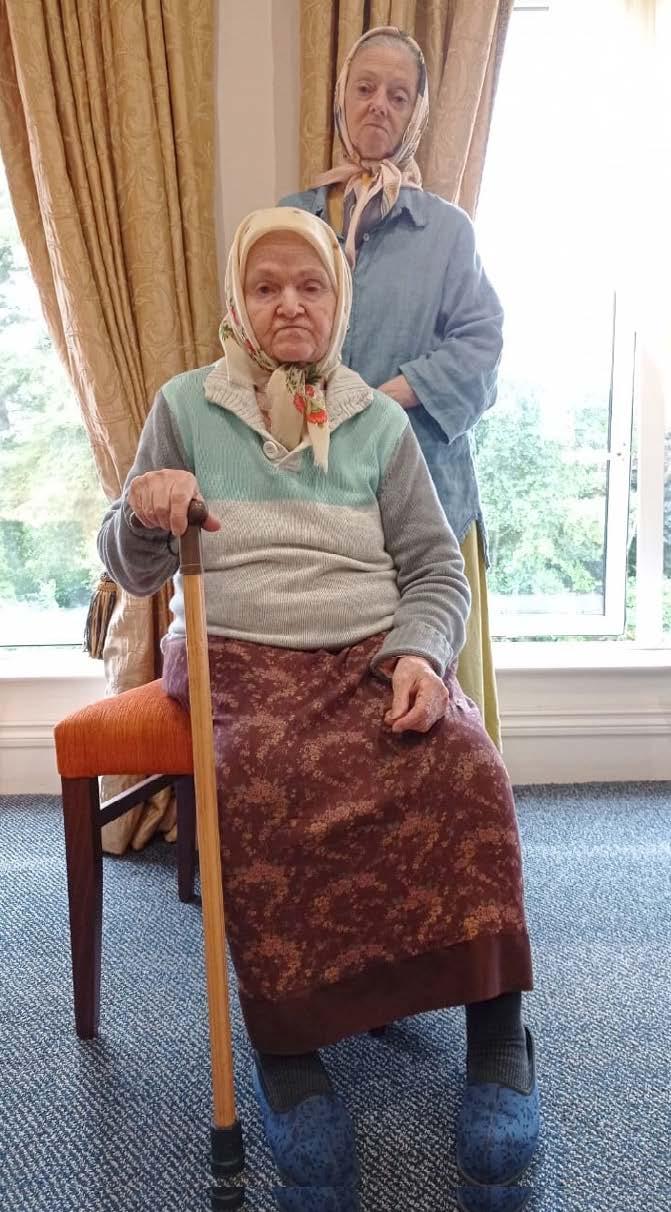
“The Irish are probably the kindest people in the world and we’ll be grateful to them for the rest of our lives,” Svitlana says.
National policy is making rural poverty worse, according to a recent study on poverty and social exclusion in Co Clare.
The report, ‘Towards an AntiPoverty Strategy for Clare’, also found there is a chronic lack of county-level data or research on poverty and marginalisation in Clare.
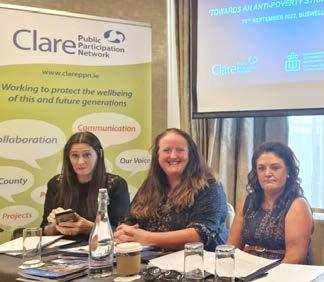
The nine-month project, the first county-level research of its kind in Ireland, was undertaken by groups led by people who experience poverty and social exclusion in Clare, and facilitated by the Clare Public Participation Network.
The report found that although Clare is experiencing a severe housing crisis, there is a housing vacancy rate of 17%. It also revealed that 33% more GPs are required to bring Clare in line with the national average.
Among those who attended the launch were Sineád Gibney, Chief Commissioner of the Irish Human Rights and Equality Commission; Mary O’Donoghue, West Clare Family Resource Centre; Bridgie Casey, Coordinator of Clare Traveller Community Development Project; Dr Conor McCabe, lead researcher; and Padraic Hayes, Clare Leader Forum.
Mary O'Donoghue said, “As one person involved in the project commented: ‘Clare is not Alaska. There is no reason services and infrastructure can’t or shouldn’t be provided here.’”
Read the full story about this research on our website.
The research report itself is available at: www.clareppn.ie
m Halyna is 90 and living in Kerry. Her family survived Stalin's famine and WWII before Putin launched his war on Ukraine.
m The attacks by Russia forced her and daughter Svitlana (66) to become refugees and their journey here was difficult.
m They believe the Irish are among the kindest people on earth.
Halyna and Svitlana never thought that war would touch their lives again. That they, in their 90s and 66, would flee its horrors to Ireland.• Halyna and Svitlana now live in Co. Kerry. Photo by Olesya Vasylenko. • Cont’d from previous page.
1 The war is only in a small portion of Ukraine so there is no need for us to take in so many people.
Robert Carey)1 At one point Russia controlled 20% of Ukraine and almost took over the capital Kiev and they still control a vast area to the east. The impact of the war has caused the greatest humanitarian crises in Europe since WW2. People have lost their homes and livelihoods, with some 6.7 million people having fled to Europe, and the economy has shrunk by 35%. The UN estimates 15,245 civilian casualties to date.
War crimes are reported to have been committed, including torture and gender-based violence. The ultimate outcome of the war is unknown and it will take years to rebuild the country.
2 Yes, because they were asylum seekers or refugees who fled to Ukraine for safety before the war and they are now refugees again.
3 Ukrainians are not migrating for economic reasons, but fleeing war. As my colleague Olya told me, “We are not here for a better life but for a safer life.* Therefore they come from a variety of economic backgrounds and some luckily managed to bring in their cars.
4 Since the imposition of martial law, males aged 18-60 are prohibited from leaving the country. There are however some exceptions, including: Those who have a physical disability, those who raise three or more children under 18, or are carers, or have a dependent child with a disability. There are also some men who are eligible to fight who have fled as they didn’t want to partake in the war for various reasons.
5 As they are here on a temporary protection order, they are entitled to the same services as an Irish person, including social welfare. There are over 54,000 Ukrainians in Ireland and more than 7,500 are working. Many are filling jobs where there are shortages and are anxious to work – lack of English, transport and childcare are barriers. There is pressure on services which were already underdeveloped beforehand, and the way the rollout of support for Ukrainians has been implemented can be improved, but people are fleeing for their lives.
6 Homelessness and housing issues are the result of various Government policies over a long period of time. It is understandable

issues
more needs to be done, however
analysis which shows refugees are
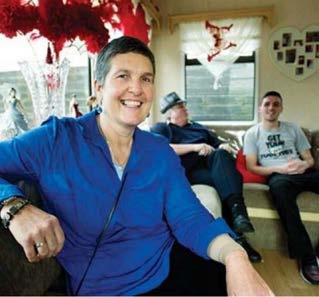 BY RAY
BY RAY
In response to the refugee crisis, in the summer, increased funding was allocated to the Social Inclusion and Community Activation Programme (SICAP). Local Development Companies have used this funding to recruit Ukrainian speakers to work as development workers.
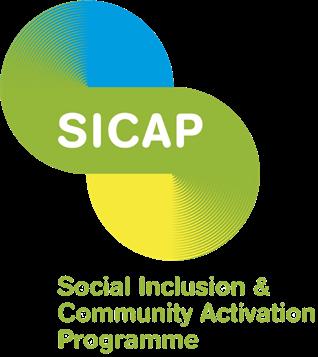
Today, for instance, many Ukrainians in Offaly have jobs or have signed up for courses due to the appointment of Svitlana Osmachko as a Ukrainian support worker with Offaly Local Development Company (OLDC).
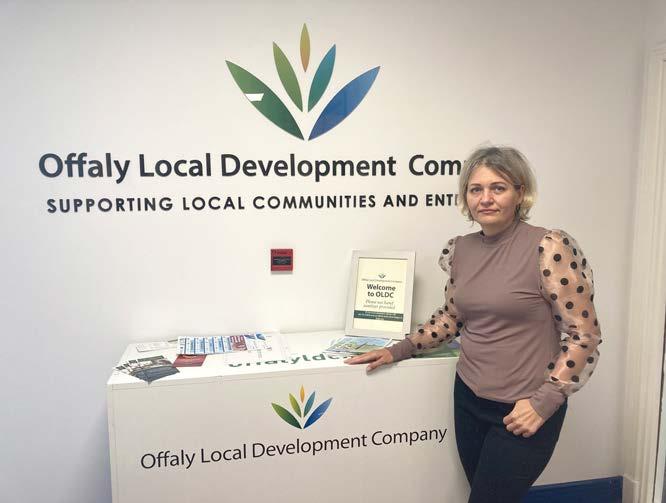
Reporter Ray Lucey interviewed Svitlana:
Svitlana moved to Ireland in the Springtime and commenced work here in late June, and to date, has witnessed a high success rate for applicants due to her involvement.
Her main role is as a translator for fellow refugees from Ukraine. She helps them to draft CVs and prepare for interviews. She played an integral part at the inaugural Offaly Jobs Fair held in Tullamore during the summer by assisting in Ukrainians securing employment and attaining course places.
She spoke to ‘Changing Ireland’ about her role and experiences to date.
She said the two most common barriers to progression are often language and verification of qualifications, understandable
considering that many left their certificates and degrees behind them as they fled. This is a particular difficulty for those seeking teaching positions.
Svitlana said that people fleeing the war in Ukraine and arriving here often don’t know how to continue work in their fields, so end up securing employment in completely different spheres.
“Some start with courses as they want to try something new. Almost all people try to find a job, because it’s very difficult to not do anything. Most of them are looking for jobs in cafes, shops, and some girls found a job in a factory.”
Svitlana previously taught English at the University of Economics in Kharkiv, Ukraine’s second largest city, so the forced evacuation from her homeland led to a transformation in her career direction.
She spoke of her experiences before leaving and her subsequent hurried departure.
“It was a very spontaneous decision to come here after leaving our country because of fear,” she said. She chose Ireland because we speak English, so she knew it would easier for her to get along with people.
“Irish people are very friendly and hospitable. It’s very pleasant to be among Irish. They like talking and we especially need communication at this time as we don’t have many people close to talk to”, Svitlana said.
She left Kharkiv with virtually nothing and spoke highly of the support given to her on arrival by the Offaly Volunteer Centre.
“We spent four days and nights in a basement so when we came home I couldn’t think properly. I left home with just a small rucksack. I didn’t have a suitcase because there were too many people on the train and we weren’t allowed to take them.”
Svitlana alluded to the almost permanent issues that follow all Ukrainians that this reporter has met - that of homesickness and the uncertainty of their futures. Through her work and work by others in similar posts – they are at least able to make the lives of refugees more comfortable and stable during their time here.
The late Ronnie Fay, who was a co-director of Pavee Point for many years and was the chairperson of Community Work Ireland, has been honoured posthumously with a Lifetime Achievement Award by the International Association of Community Development (IACD).
The IACD connects community development organisations in 60 countries and Ms Fay, who sadly passed away last January, becomes just the fourth recipient of the award. It is presented to people deemed to have made an outstanding contribution in the field of community development.
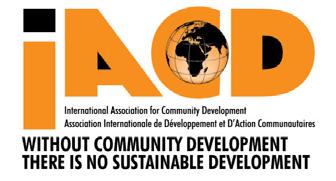
IACD chairperson, Anna Clarke, said, “Ronnie’s long-standing reputation as a champion of human rights and justice, and her focus on community work practice at home and internationally made her a most worthy recipient of the IACD Lifetime Achievement Award.”
The award was accepted by Ronnie’s husband Philip Watt at this year’s IACD AGM, which was also attended by members of her family, colleagues from Pavee Point and representatives from Community Work Ireland.
The award was welcomed across the community development, equality and statutory sectors where Ronnie made a lasting and influential contribution.
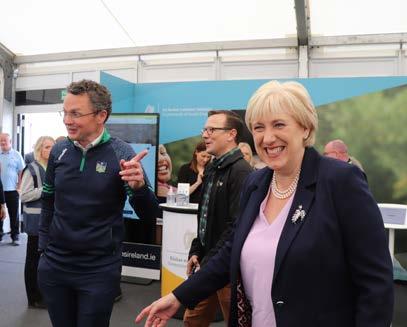
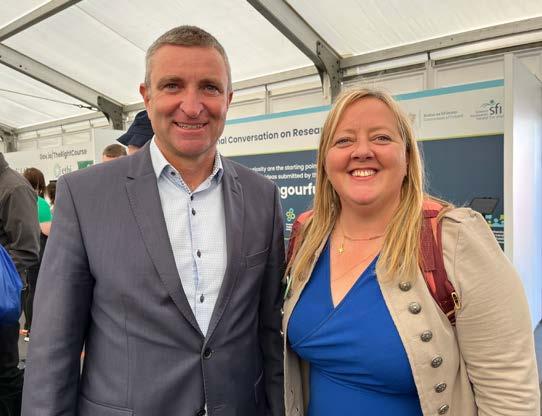
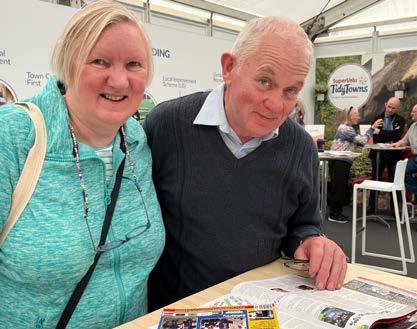
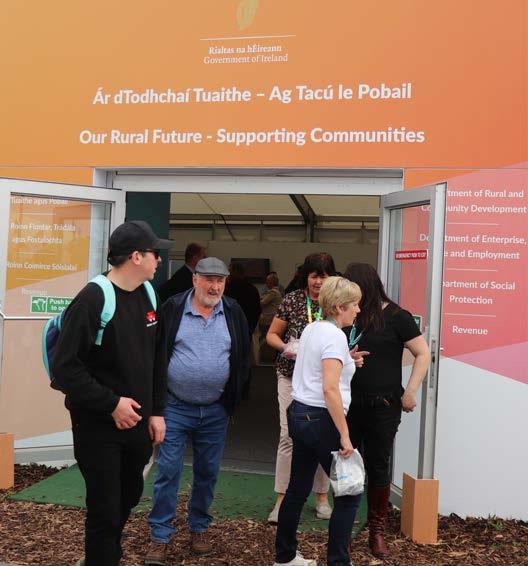

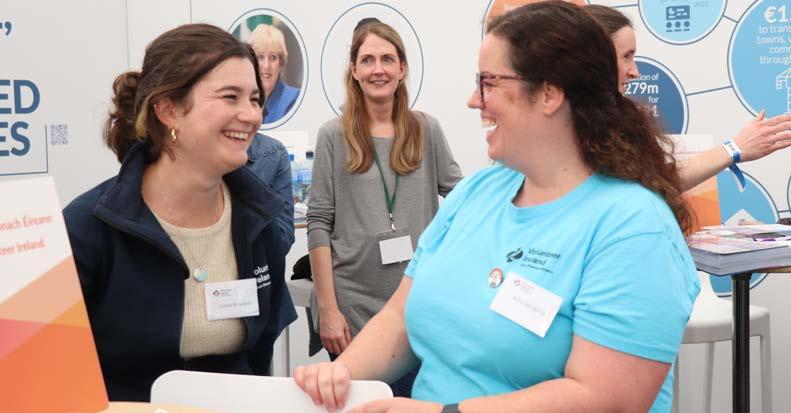
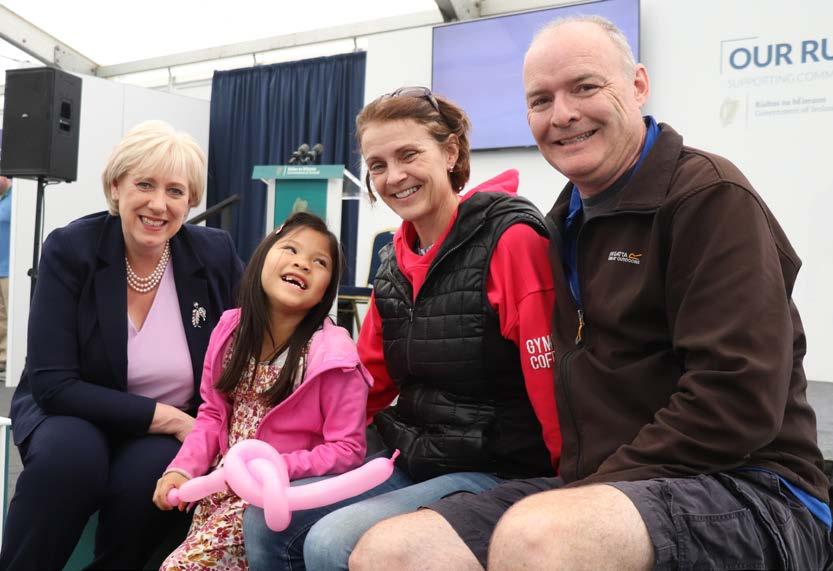
• A young boy at the Ploughing sees the future calling.
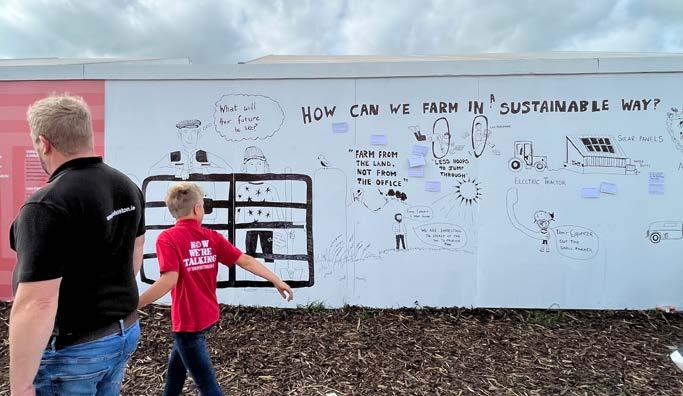
• Wine is permitted during your 30-day local food challenge. "It's only about food. You can drink what you like," says Lisa, as wine-growers worldwide breath a sign of relief.
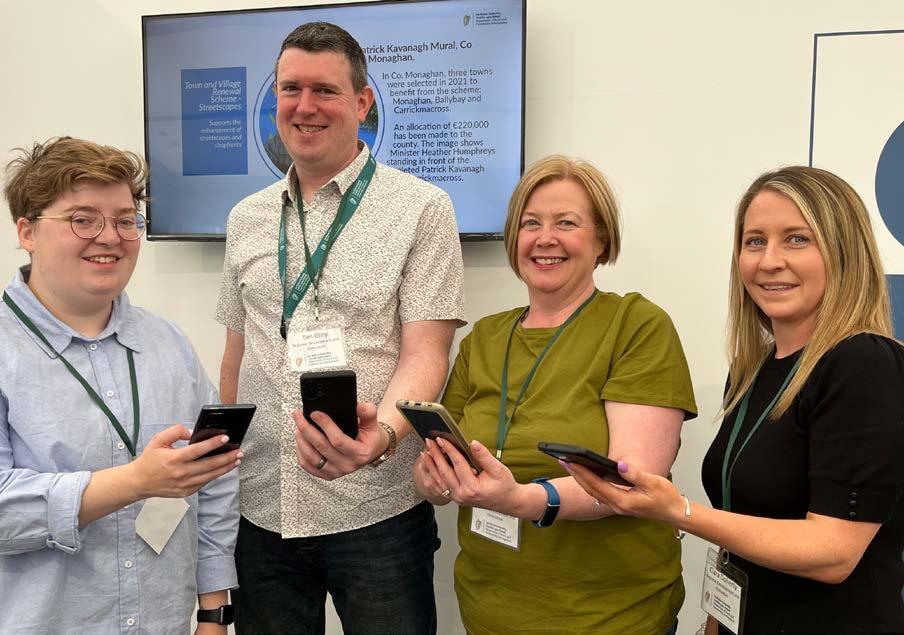
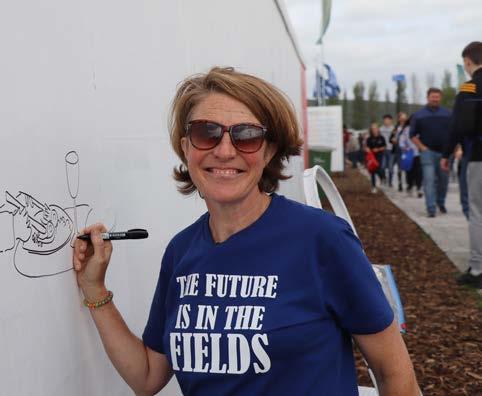
We previously featured Lisa Fingleton, author of 'The 30-Day Local Food Challenge' and when we bumped into her outside the 'Supporting Communities' marquee at the Ploughing Championships, guess what - she had embarked on another 30-day challenge. She does so every September - the easiest month to source Irish-grown food.
Lisa wants each of us to think about where our food comes from. She was munching on a "fresh" takeaway sandwich one day when she happened to look at the ingredients - over 40 from all over the world.
We met her while she was drawing.
"Well, have things improved in the past few years? Are we still only using one per cent of Ireland's arable land to grow vegetables?" we asked.
"It's still one per cent," she replied. "It has to improve."
She was joined at the Ploughing by artists from Corca Dhuibne in Co. Kerry and Waterford Walls. Their presence was supported through the Government's Creative Climate Action fund.
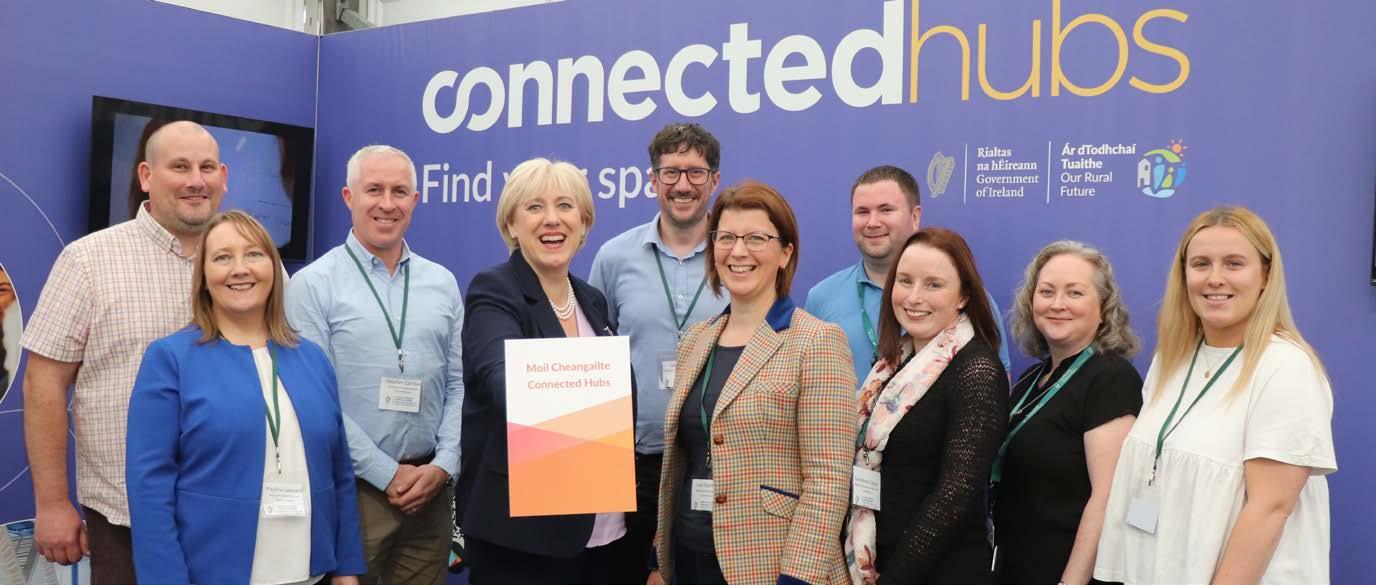
If you would like to take on the challenge to cook and eat healthily for a month using only locallyproduced ingredients, check out Lisa's website.
W: https://lisafingleton.com/
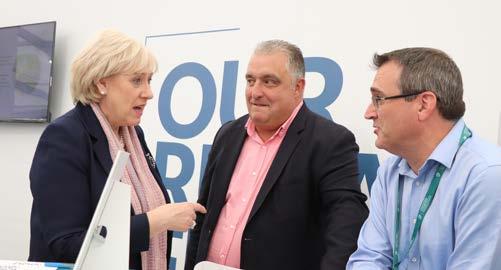
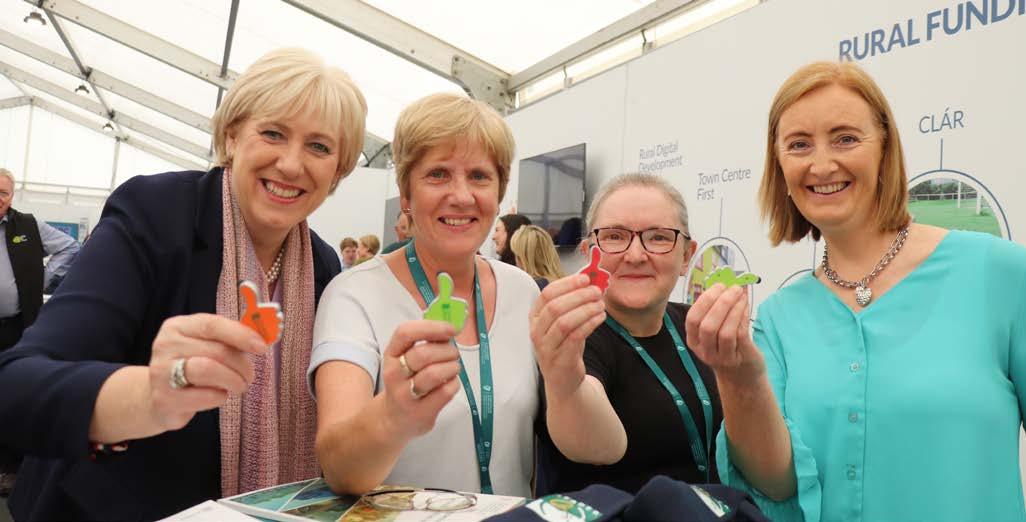
It was marvellous to be back at the Ploughing Championships. I barely saw a tractor, never mind a plough, but it was great to see faces that had become one-dimensional on Zoom - to meet people in person.
The attendance of 130,000 or so on the thankfully dry day I attended didn't all visit the 'Supporting Communities' marquee at once, but there was a steady stream of visitors.
And everytime you turned your head you'd spot a face you knew from politics.
I bumped into a local TD from my area, a senator from a neighbouring county and was introduced to an MEP. All in the space of two minutes. Shout out to Niall Collins, Róisín Garvey and Grace O'Sullivan!
Soon after, Minister Heather Humphreys arrived and she took her time greeting members of the public and civil servants, agency workers and volunteers behind the stands. When I asked her a silly question while taking photos ("What's that Minister?") she shone a "LEADER" mini-torch in my eye. I've now seen the light and I got to keep the torch and blind others who ask "What's that?".
I met people who knew all about the value of the Seniors Alert Scheme, heard a community worker from Clare Island praise good internet and remote working. I learned new things about the Peace Programme.

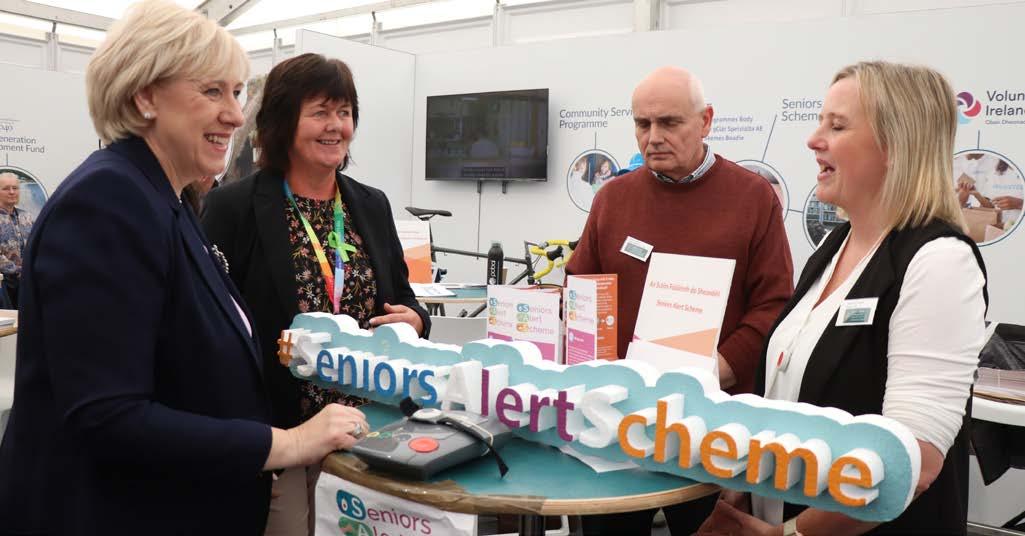
And I knocked a cup of coffee over in extending a hand to greet Ciaran Mullooly from Roscommon. Thankfully I intercepted the flying cup before it destroyed him.
After nine hours without eating, it was time to hit the road. I've learned since Carlow in 2019, when I had to wait 'til everyone left to see what field my car was in. This year, I was in the VIP field and behind the wheel in 10 minutes.
You learn!
"I knocked a cup of coffee over in extending a hand to greet Ciarán Mullooly. Thankfully I intercepted the flying cup before it destroyed• Discussing the Seniors Alert Scheme: Minister Humphreys, Bernie Reape, Dept of Rural and Community Development, William Marum from Laois Partnership and Amanda Treanor from Pobal. • Minister Humphreys and staff from the Dept. of Rural & Community Development give LEADER the thumbs up. The 'thumbs up' devices are torches, handed out as freebies on the day to visitors, including journalists - read the side panel to discover how Meagher was temporarily blinded by one while busy snapping this photo. • Minister Humphreys meets staff and volunteers from Tidy Towns. • Minister Humphreys and Brendan Mahon and Brian Alcock of the Dept. of Rural & Community Development.
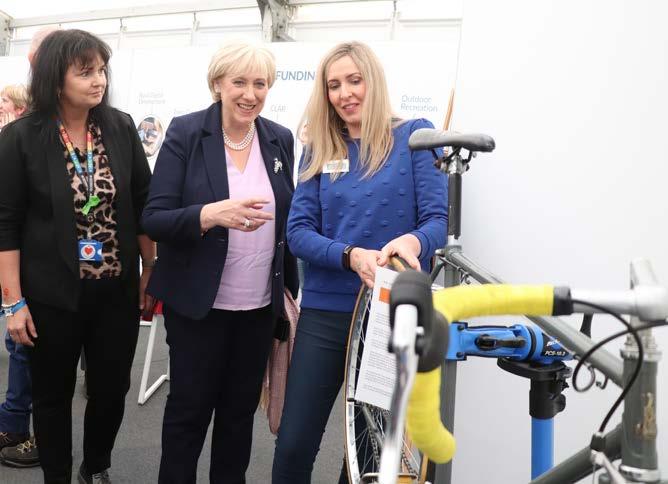
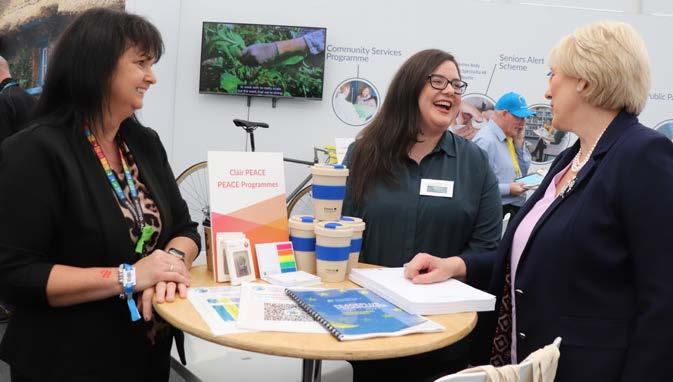
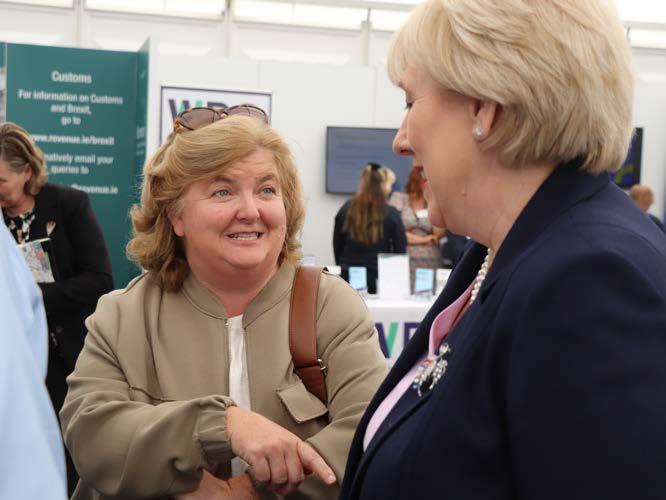
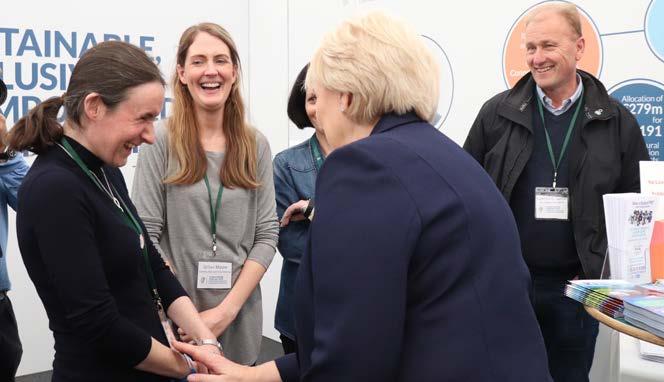
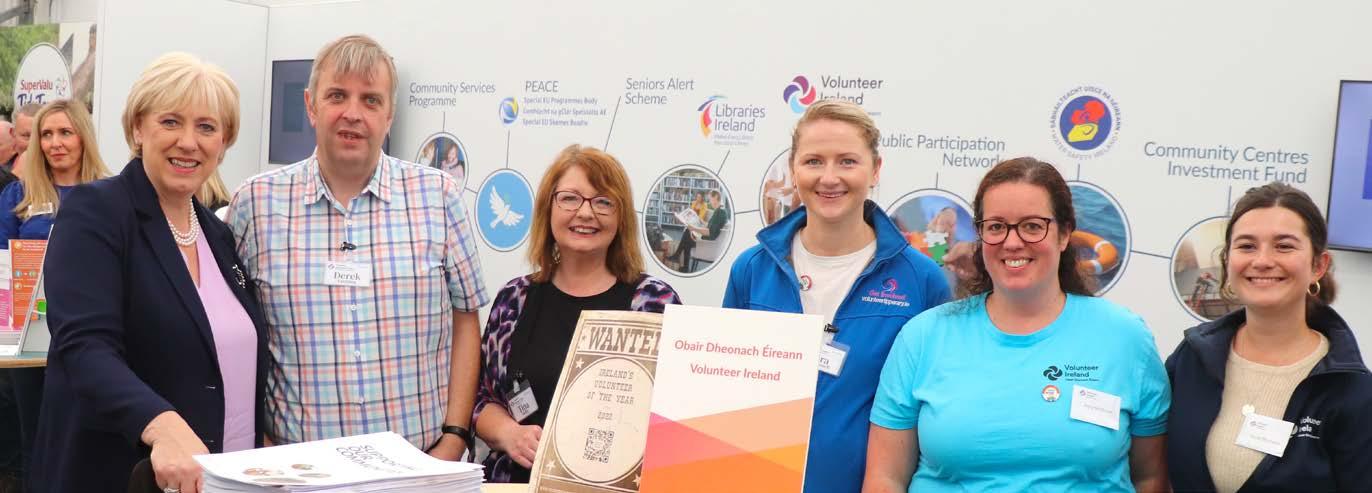
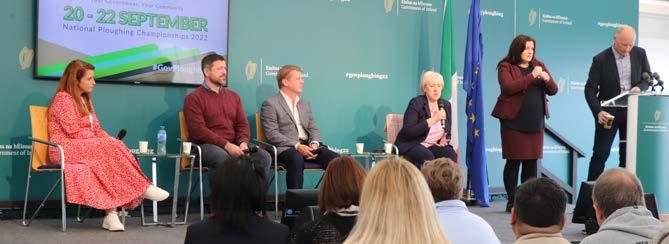
When ‘Changing Ireland’ asked for photos of the newly-opened playground in Mount Carmel Drive, Moate, Co. Westmeath, we received 26 to choose from. It was clear there is great delight in the new facility which officially opened this summer. So how does a community go about getting a playground?
Months earlier, we met members of the local residents’ association when their grassy patch was all dug up. The diggers had just gone in. The playground was four years in the making at that point, but all agreed it was worth it.
“I’m here 38 years and this is the best thing to happen here,” said Marie Fleming, pointing to heaps of muck, gravel paths and new concrete kerbs.
Marie – a committee member of the residents’ association - thought the playground would be “easy-peasy”.
“I’ll be honest,” she said. “When we started I was very naïve. We started in March 2018 and I thought we’d have a playground by Christmas. I learned that nothing happens that quickly. For three years, we were saying that Mount Carmel was getting a playground. We had Covid in the middle of it, but it was worth it.”
“The cost was €80,000 in all. The groundworks cost around €36k. Equipment cost about another €40k. It’s not cheap, but at the end of the day it’s here for life. When I’m dead and gone and my grandchildren have grown up - whoever’s living in Mount Carmel then - if they mind it they’ll have it for their children as well.”
Mary Greally, chairperson of the residents association, said: “Our goal was to get a playground for our children and grandchildren and somewhere nice where we can sit and have a laugh and relax while watching our children and our grandchildren play.”
Marie said, “About 30 children live in the area, but you have grandchildren coming in as well and there wasn’t really anywhere for them to play. There is a lovely amenity park on the Lake Road in Moate, but that’s a good mile from here.”
There are 44 houses in Mount Carmel Drive.
“This is definitely the best thing to happen in this area. The kids play
football on the green, but this is the best ever,” she said.
Mary agreed:
“I’m all my life living in Moate and it’s great to get this done - through the council, SICAP, and LEADER. We had great support.”

It wouldn’t have happened without the residents, but they in turn grew with support from the local development company.
As Mary said, “We’re lucky to have Westmeath Community Development (WCD). Linda Jo Quinn and Caroline

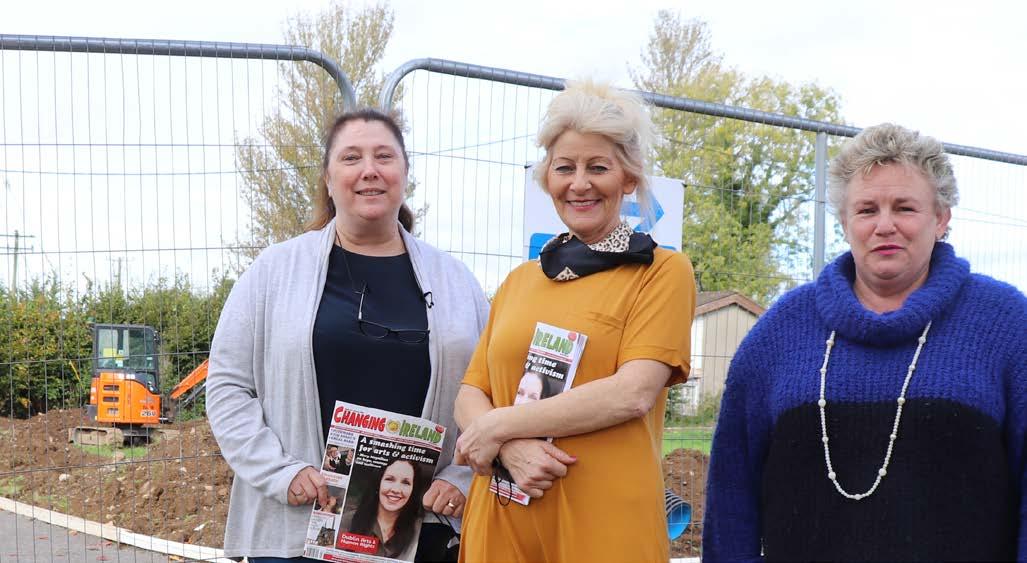
Lawlor give great back-up. It started with them. They helped us get on track.”
Through WCD, the residents’ association began to receive a small annual grant which came through the Social Inclusion and Community Activation Programme (SICAP).

“SICAP is very good,” said Mary. “It gives €1,500 of a grant for your community group each year.”
Marie added: “You decide what you spend it on. You agree on what you need. You buy it - and you make sure you keep your receipts. We’ve everything accounted for.”
“So, we now have a shed to store our lawnmower and tools. You can’t fundraise for that kind of thing – sheds and lawnmowers. SICAP gave us the funding. It’s brilliant.”
Development worker Linda Jo Quinn said, “We first met Mount Carmel Drive in 2018 and there was a lot of anger then from people who felt there wasn’t enough being done in
the area.”
As Mary recalled, “We might have had some argy-bargy, but now we’re all working together. As a community the whole lot of us are working together. Now people living up here say, ‘It’s great to see something happening’. That’s great for us (volunteers) to hear.”
Linda Jo recalled: “We organised meetings in the Carmelite Centre and helped to get a residents’ group together. We got training for them and they worked on a plan - all through SICAP support.”
“What happened was that, under SICAP, a number of estates in Co. Westmeath were earmarked in 2018 for special attention by the Local Community Development Committee. Mount Carmel was one of them. We only work in certain designated areas. We can’t be all things to all people.”
“And early on it became really
"We had to think outside the box. Community development is always about thinking outside the box.” - Linda Jo Quinn, community worker
• Cont’d from back page.
Leesa referred to a lack of notice and information from the Government.
She said the implementation of the funding change in mid-September created a difficulty because contracts would ideally have been finalised before the academic year began.
Additionally, Leesa feels that if there was “one unified group”, instead of segregation across several trade unions and representations, the wait for the pay increase may not have been so long. She would like to see one umbrella group for all childcare providers to unify and strengthen workers’ voices.
evident how enthusiastic the residents were. There were many meetings and volunteers put in a lot of time”
An opportunity to increase the funding support soon became apparent.
“When we saw they wanted a playground, we realised there was the potential for LEADER funding,” said Linda Jo, “but that would also mean the residents having to raise match funding.”
“We asked our colleague Peter Ormonde to meet the residents and develop the idea. The residents’ group were fantastic. They ran three or four indoor markets each year. They were packed out and that’s how they raised their match-funding to qualify for the LEADER grant.”
“Then Covid hit and everything stalled, but here we are today,” she said.
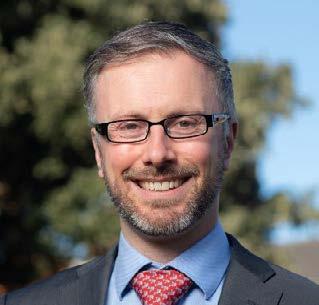
The residents also received strong support from a number of councillors on Westmeath County Council. They named Tom Farrell, Vinnie McCormack and Frankie Keenan in particular who helped out when the residents needed something.
“I’d say they probably hide when they see us coming now,” laughed Mary.
Previously, the council had put up basketball hoops and laid down a footpath through the green for older people walking to the bus stop.
Mary added, “This is phase one. Hopefully, we can develop on it. We want to get football posts up for the boys and girls.”
The residents also have a vision
for “a better Moate” with their playground playing its part in improving the town.
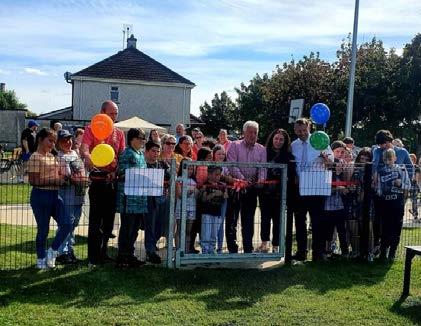
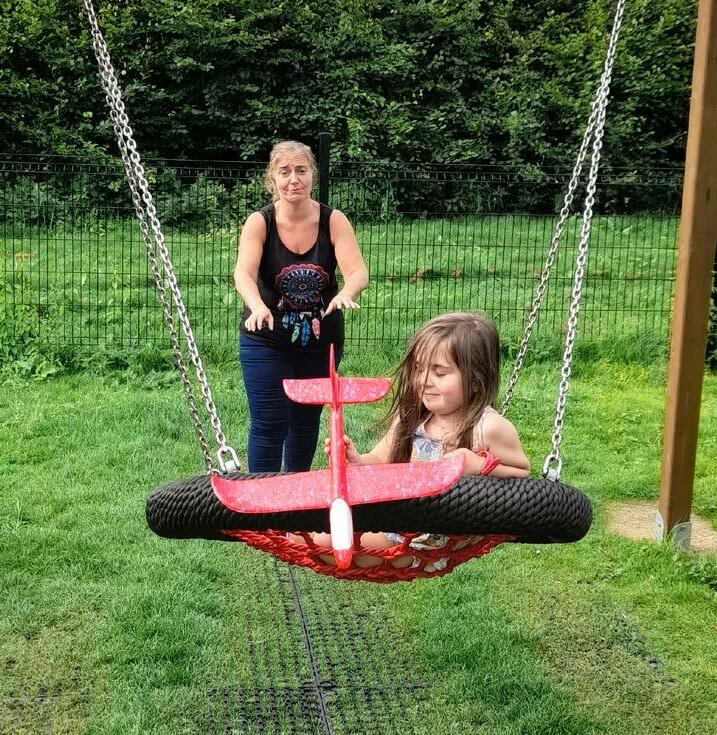
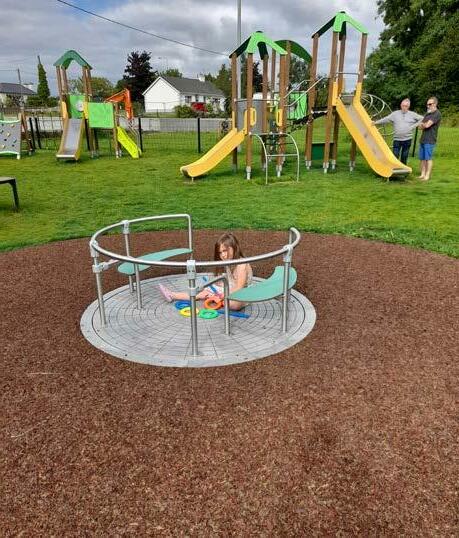
“We have a great committee,” they both agreed. "We are all from Moate and know each other for years.”
They listed out committee members Carmel and her husband Ross, Annie the treasurer, Catherine the vice-secretary, Michael the PRO. No doubt the list goes on.
They feel the pandemic made them stronger.
As Linda-Jo said, “You have to think of the positives of the whole pandemic. It did make people rethink what’s important. And it was brilliant the group stuck together through Covid. We all learned how to use Zoom and once it was safe we started having outdoor meetings on the green. We had to think outside the box. Community development is always about thinking outside the box.”
While the Government has long recognised that a child’s formative years are the most important in their development, it took until now for wages to come close to matching those of primary school teachers.
Figures from SIPTU show:
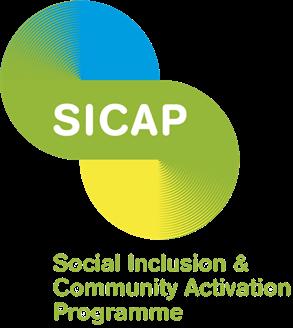
– the average wage currently for a QQI Level 5 Early Years
Educator is €11.57 per hour, which is significantly lower than the Living Wage of €12.90.
– For an Early Years Room Leader with a QQI Level 8, the present average is €13.21 per hour.
The new order will see these rates rise to €13 per hour for the former and €15.50 for the latter. The pay deal comes into effect from Thursday, September 15th.
The Early Years Sector is 98% female.
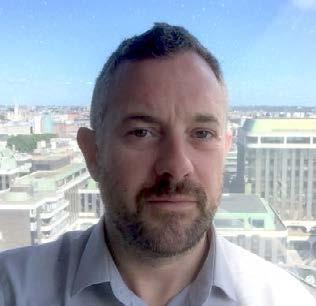
“I’ll be honest. When we started I was very naïve. I thought we’d have a playground by Christmas."
- Maria Fleming, resident
On Wednesday, September 7th, the Government signed off on an Employment Regulation Order that quickly introduced higher minimum wage levels for staff in the Early Years Childcare Sector. This means the government subvention for childcare has increased.
It seemed that the protests from the professionals caring for the nation’s children and trade unions such as SIPTU were finally heard. So, how was the announcement greeted at community childcare level?
Caoimhe Lalor and Ella JonesBourke interviewed Leesa Flanagan of Little Seeds Childcare in Moyross to gain an insight into how those working in the sector feel about the change:
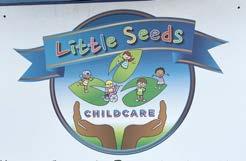

Leesa is utterly dedicated to early years education and she termed this week’s announcement “historic”.
She and her colleagues in Moyross include many who took part in the massive protest held in Dublin, in February 2020, over early years pay. Over 30,000 workers and voluntary management members were estimated to have joined the march. (It featured on the cover of ‘Changing Ireland’, Issue 68).
Leesa is a former manager of Little Seeds Childcare and has 17 years of experience in the sector and on this issue. Throughout her career, she saw the campaign grow.
“This is an historic moment for childcare providers,” she said.
Leesa was very clear in her view that even though the new regulation order is only a “stepping stone”, it is most certainly a significant move in the right direction. She sees the importance of “embracing and acknowledging the positives” that will emerge as a result of increased wages.
Some of these positives include an increased scope for quality within each room in the creche and the ability to hire experienced room leaders. These changes will enhance the standard of care within early years education settings, in Leesa’s opinion.
Leesa is currently studying for her PhD on Mindfulness in Early Years Education and holds the title of

In a statement, the trade union welcomed the Government’s announcement of a pay deal. The agreement was negotiated by SIPTU organisers and activists on behalf of the union’s 6,000 members in the sector and will set legally binding rates of pay. The agreement was announced on Wednesday by the Minister of State for Business, Employment and Retail, Damien English.
Minister English said the Employment Regulation Orders apply to around 27,000 staff.
Children's minister, Roderic O'Gorman, said, "I hope that early years educators and school-age childcare practitioners can now see a real future for themselves... it is the staff who are key to the quality of children’s experiences”.
SIPTU Head of Organising, Darragh O’Connor, said:
“This pay deal, and future pay
Family and Community Engagement Co-ordinator at Moyross Community Enterprise Centre which supports Little Seeds Childcare.
She is driven by the motivation to “provide a quality, nurturing environment,” particularly as Moyross is “deemed a disadvantaged area.”
Through her family outreach, she aspires to make a difference in the lives of not only the child, but to the family unit – by offering support to parents and guardians around the care of their children. This is especially important post-Covid-19, where she has witnessed children with “increased anxiety and being behind
developmentally.”
Like many childcare workers up to this point, her “intrinsic motivation” to provide a multifaceted education to young children kept her in the sector – despite the inadequate pay. However, many were forced to quit for better pay elsewhere.
Leesa said the increased funding though welcome, is definitely needed – especially post-Covid – to support staff and childcare.
SIPTU had warned in August that the sector was in danger of collapsing and it called on the Government to invest an additional €150m in childcare, split between pay and affordability issues:

increases, means that Early Years professionals can plan to stay in their chosen profession in the long term. These incredible union activists and members are an example to all low paid workers.”
Mr O’Connor added:
“This is our first pay deal, not our last. The campaign for recognition, respect and professional pay and conditions will continue.”
And
"HISTORIC
- Moyross’s Leesa Flanagan welcomes
“This is our first pay deal, not our last. The campaign for recognition, respect and professional pay and conditions will continue.”
- SIPTU's Darragh O'Connor
"I hope
and
practitioners can now see a real future for themselves." - Minister
Roderic O'Gorman• Leesa Flanagan outside Little Seeds Childcare with Caoimhe Lalor and Ella Jones-Bourke. (Caoimhe